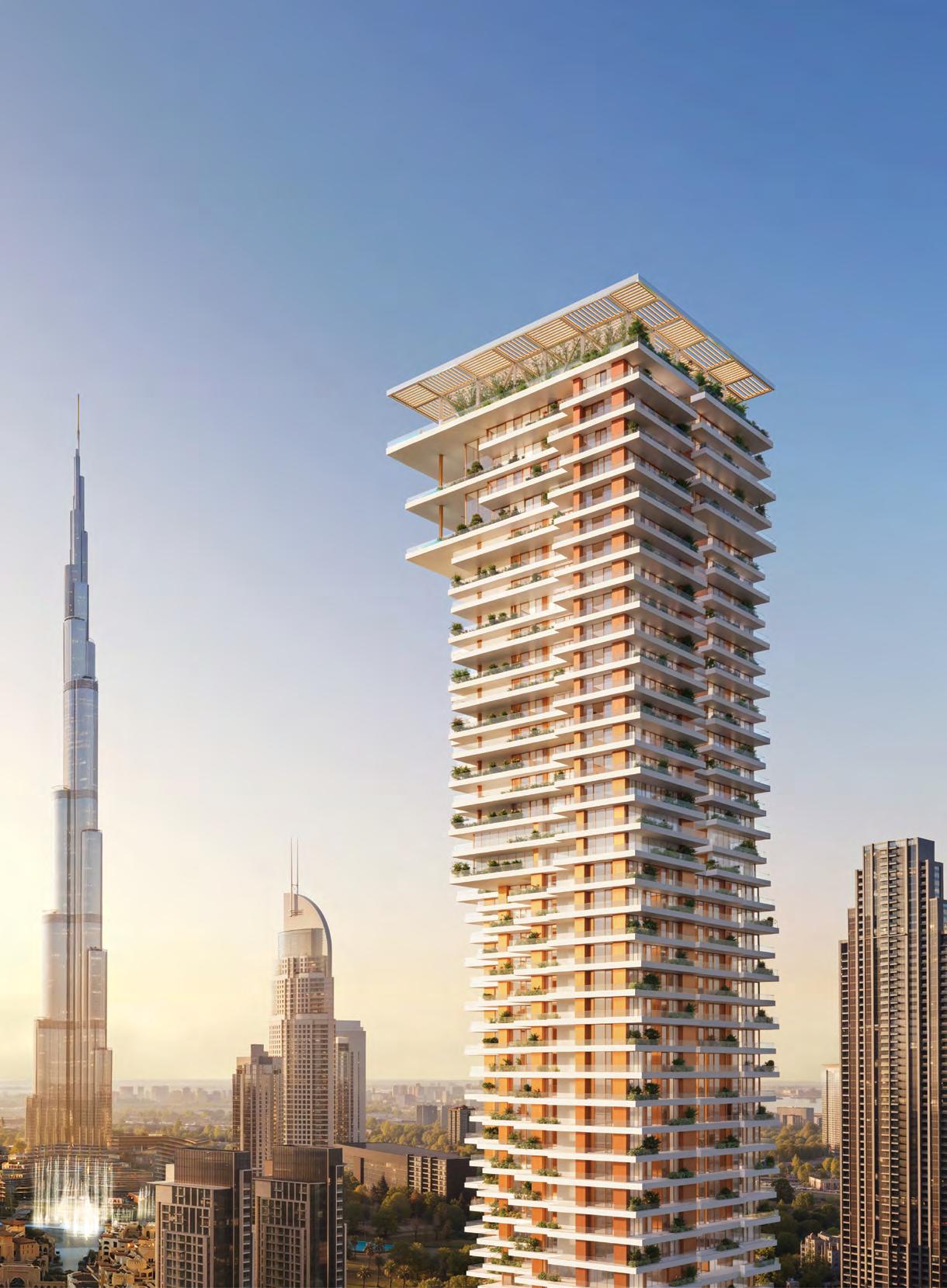Leaders of the Land
The 10 Faces Driving Saudi Arabia’s Real Estate

NOVEMBER 2025
Co-founders Arman Khederlarian and Bassem Jamaleddine of Maharat have created a space where Arab voices, stories, and talents come together

The 10 Faces Driving Saudi Arabia’s Real Estate

Co-founders Arman Khederlarian and Bassem Jamaleddine of Maharat have created a space where Arab voices, stories, and talents come together
Sultan Alshakrah builds horizons where vision, heritage, and human experience coexist

Bringing luxury seaside living to Sharjah for the first time, owners at the Anantara Sharjah Residences enjoy access to the Anantara Sharjah Resort’s world-class amenities, including an infinity pool, five distinctive restaurants, an Anantara Spa and a state-of-the-art gym. As an investment, owners can enjoy the benefits of a rental management scheme operated by Anantara Hotels, Resorts & Spas, allowing them to maximize their returns when they are not resident in the property.
To register your interest, visit arada.com
LIFE IS A JOURNEY.
Sultan Alshakrah shapes enduring cities, weaving legacies of vision and grandeur that will thrive for generations.

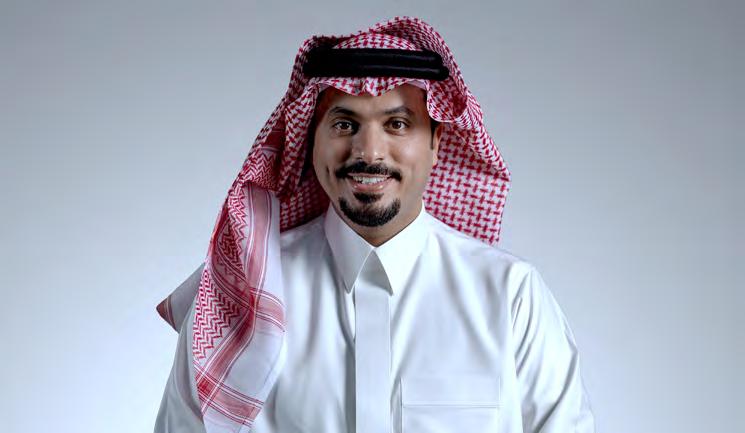



HOW RADISSON HOTEL GROUP IS CRAFTING THE FUTURE OF GUEST EXPERIENCE
BETWEEN THE LINES THE MAN WHO MOVES MENA





Step into a world of opulence when you book a Suite at Raffles Doha.
Experience the added luxury of QAR 750 credit to spend on dining in the hotel, and QAR 500 towards any Spa treatment.
Children aged 12 and below are welcome to indulge in the enchantment of complimentary dining.
Rates starting from QAR 3,500 per night
For reservations, please call +974 4030 7100 or email reservations.doha@raffles.com
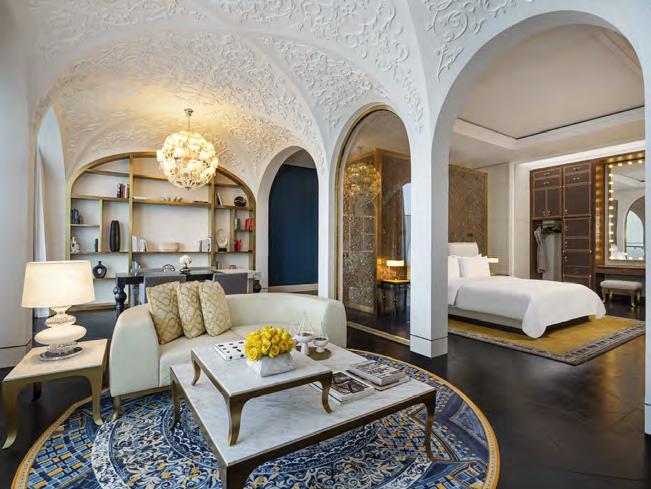

CEO
Wissam Younane wissam@bncpublishing.net
Managing Director
Rabih Najm rabih@bncpublishing.net
Group Publishing Director
Joaquim D'Costa jo@bncpublishing.net
Editor
Aya Zhang aya@bncpublishing.net
Digital Reporter
Reeba Asghar reeba@bncpublishing.net
Creative Lead
Christian Harb chriss@bncpublishing.net
Junior Art Director
Rizaldi Febrian
Marketing Executive
Aaron Joshua Sinanbam aj@bncpublishing.net
Videographer
Eduardo Buenagua
Joel Amparo
Contributors
Aalia Mehreen Ahmed, Seymone L Moodley, Vibha Mehta
subscriptions@bncpublishing.net
PO Box 502511 Dubai, United Arab Emirates P +971 4 4200 506 | F +971 4 4200 196
For all commercial enquiries, contact jo@bncpublishing.net T +971 50 440 2706 All rights reserved © 2025. The opinions expressed are solely those of the contributors. Business Today Middle East and its affiliated publications in the MENA region are exclusively licensed to BNC Publishing. No part of this magazine may be copied, reproduced, or transmitted in any form or by any means without prior written consent from the publisher.
Printed by United Printing and Publishing | upp.ae






Require formwork and scaffolding? Check out Doka’s extensive list of products and systems, which now includes scaffolding for a variety of applications. At Doka, our philosophy is to provide a broad range of services under one umbrella based on a growing demand for single-source solutions that adhere to the highest standards.
/DokaMEA /company/doka-middle-east-africa /doka_mea
meaapmarketing@doka.com | www.doka-me.com
LETTER FROM THE EDITOR
The Middle East has never been short on ambition, but what we’re seeing today is something entirely new. Boardrooms have become laboratories for innovation, skyscrapers are turning into ecosystems of ideas, and industries once defined by tradition are now driven by transformation.
Across the region, from Riyadh’s bold reinvention to Dubai’s ever-evolving digital edge, from Bahrain’s fintech surge to Egypt’s startup resilience, a new business narrative is unfolding.

It’s confident, connected, and unapologetically forward-looking.
We are here to capture that momentum, to record the conversations shaping the future, to tell the stories of people driving the change, and to explore the forces redefining what success looks like in this part of the world. Whether it’s real estate visionaries reshaping the skyline or tech leaders building what’s next.
Every era has a place that defines it. Right now, that place is here. The Middle East is where ideas are tested, built, and scaled. It’s where change is inevitable.
Aya Zhang Editor aya@bncpublishing.net
Zhang xiaoyuezhangg
BEGA pole-top luminaires with BugSaver® technology protect nocturnal fauna by reducing the color temperature from 3000 Kelvin to an amber color around 1800 Kelvin, which reduces the light attractive effect. The color temperature and output can be controlled dynamically. bega.com/bugsaver

Das gute Licht.
The firm’s investment in Sindbad.tech marks a new step toward smarter, tech-powered brokerage solutions.
Alkhabeer Capital, the financial institution specializing in Shari’a-compliant financial services and brokerage services, has announced the signing of a subscription agreement to acquire shares worth SAR 18 million in Automated Economy Holding Company, the sole owner of Automated Support for Financial Technology (commercially known as Sindbad.tech), which underscores Alkhabeer Capital’s commitment to advancing innovation in brokerage services.
Sindbad.tech is the first Saudi firm to be granted a fintech experimental permit by the Capital Market Authority to test robo-advisory services powered by artificial intelligence. The platform leverages AI to analyze data, provide investment advice, and manage portfolios instantly and on a personalized basis.
This investment will enable Alkhabeer Capital to launch a new generation of investment products and funds, in addition to customized portfolio management solutions, supported by this advanced technology. This will strengthen the Company’s ability to deliver cutting-edge investment services, enhance decision-making efficiency, and create added value for clients in a dynamic and fast-growing environment. Commenting on this milestone, Ahmed Saud Ghouth, CEO of Alkhabeer Capital, stated: “This investment is an extension of our innovation-driven strategy and reaffirms our commitment to supporting transformative technologies in asset management and brokerage. We believe that combining human expertise with advanced AI-powered solutions will allow us to design more efficient investment experiences that are closely aligned with the aspirations of our clients.”
Mohammed Agbawi, CEO of Automated Economy Holding Company, added: “We are witnessing the beginning of a new phase of growth through the
addition of a strategic partner with deep expertise such as Alkhabeer Capital. Sindbad.Tech is proud to be the first Saudi company to obtain a fintech experimental permit which is the use of A.I. in advisory. This collaboration marks a turning point in the capital markets, as it will enable us to expand the scope of our AI-driven solutions and reach a broader base of investors through smart innovations that redefine the concept of wealth management.”
This investment reflects Alkhabeer Capital’s continued focus on innovation as a key growth driver and its commitment to leveraging global digital transformation trends in alignment with Saudi Arabia’s Vision 2030 In the Financial Sector Development Program. It also contributes to the development of the asset management and brokerage sector while further strengthening the Kingdom’s position as a leading regional and international financial market.
Alkhabeer Capital is one of the leading capital market institutions in Saudi Arabia, authorized by the Capital Market Authority and headquartered in Jeddah, Kingdom of Saudi Arabia, with a branch in Riyadh. The Company provides innovative world-class investment products and solutions in private equity, financial markets, and real estate investments, in addition to offering investment banking and brokerage services.
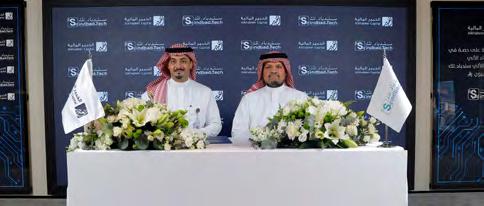
The agreement will see PIF and ACWA Power collaborate on sustainable energy and water solutions, aiming to modernise utilities, encourage private sector investment, and support Saudi Arabia’s Vision 2030.

The Public Investment Fund (PIF) and ACWA Power have signed a Memorandum of Understanding (MoU) to explore opportunities for developing power and water infrastructure across PIF’s local real estate portfolio. Announced at the 9th Future Investment Initiative (FII9) in Riyadh, the collaboration aims to enhance resilient utilities and sustainable infrastructure across PIF-owned projects.
The partnership will support the delivery of highquality energy and water services while promoting local content and private sector investment in Saudi infrastructure. The MoU was signed by
Sahem Nasser, Head of Investment Strategy, Local Real Estate Investments at PIF, and Khaled Almedbel, Head of KSA Business Development at ACWA Power, in the presence of senior leadership from both organisations.
This initiative aligns with PIF’s strategic mandate to generate economic impact, support diversification, and deliver sustainable returns for Saudi Arabia. By fostering partnerships with local and international private sector developers, PIF is advancing infrastructure, renewable energy, and water projects that contribute to urban innovation and enhance quality of life, in line with the objectives of Saudi Vision 2030.
Built to tackle the region’s diverse terrains and operational demands, these trucks and buses offer advanced features that support both passenger comfort and cargo performance.
Marking a significant milestone in its global journey, Tata Motors Commercial Vehicles, one of the world’s leading automobile manufacturers, displayed its widest range of next-generation buses and trucks tailored for the Middle East and North Africa (MENA) region. Reflecting the ‘Better Always’ philosophy – symbolising a bold leap towards cleaner, smarter, and intelligent solutions, its Euro 6 compliant range is purpose-built to serve a wide spectrum of cargo and passenger transportation. Engineered to support the region’s ambitious infrastructure development, rapid urbanisation, and expanding logistics sector, each vehicle has been meticulously engineered and rigorously tested across demanding terrains, delivering superior comfort, operational efficiency, and enhanced safety – setting new benchmarks in reliability and performance for businesses and transporters across the region.
Commenting on the unveil, Mr. Asif Shamim, Head, International Business, Tata Motors Commercial Vehicles, “As the MENA region continues to advance its economic diversification and infrastructure ambitions, there is a growing demand for smarter, efficient, and advanced mobility solutions. Tata Motors Commercial Vehicles has been a trusted partner in this journey for about six decades, and the latest range of trucks and buses reflect our long-term commitment to stay ahead of the curve. This comprehensive line-up is engineered to deliver superior performance and reliability, enabling our customers to run businesses efficiently. We are confident that these offerings will set new benchmarks and further strengthen our role in shaping the region’s evolving mobility landscape.”
Advanced Euro 6 compliant range
Passenger Mobility Solutions
• LPO 1622: Available in 11m and 12m lengths with multiple seating options, this bus is ideal for school and staff transport. Powered by a Cummins engine, it features ABS with Electronic Stability Control, Cruise Control, and best-in-class climate control — ensuring a safe, efficient, and comfortable ride.
• Starbus Prime LP 716: Powered by the newgen 3.3L engine, the LP 716 is a 28-seater bus built for school and staff transport. It combines fuel efficiency with superior manoeuvrability, advanced safety (ABS, ESC, Hill Start Assist), and class-leading comfort, delivering exceptional value for operators and passengers.
• Ultra LPO 916: 33-seater bus for school and staff transportation offering superior fuelefficiency, drivability and reliability.
Cargo Mobility Solutions
• Ultra Range: Built on Tata Motors’ nextgeneration smart truck platform, the Ultra range, available from 7-19 tonnes configuration offers unmatched versatility, powering a wide array of applications, ideal for intra-city logistics and last-mile delivery.
• Prima 3430.T: Powered by the proven 6.7L Cummins engine generating 300HP of power and 1100Nm of torque. Ideal for long-haul operations, combining efficiency, reliability and performance.
• Prima 3330.K: High-performance tipper, designed to handle the toughest terrains and heaviest loads, delivering superior productivity in construction and mining operations.
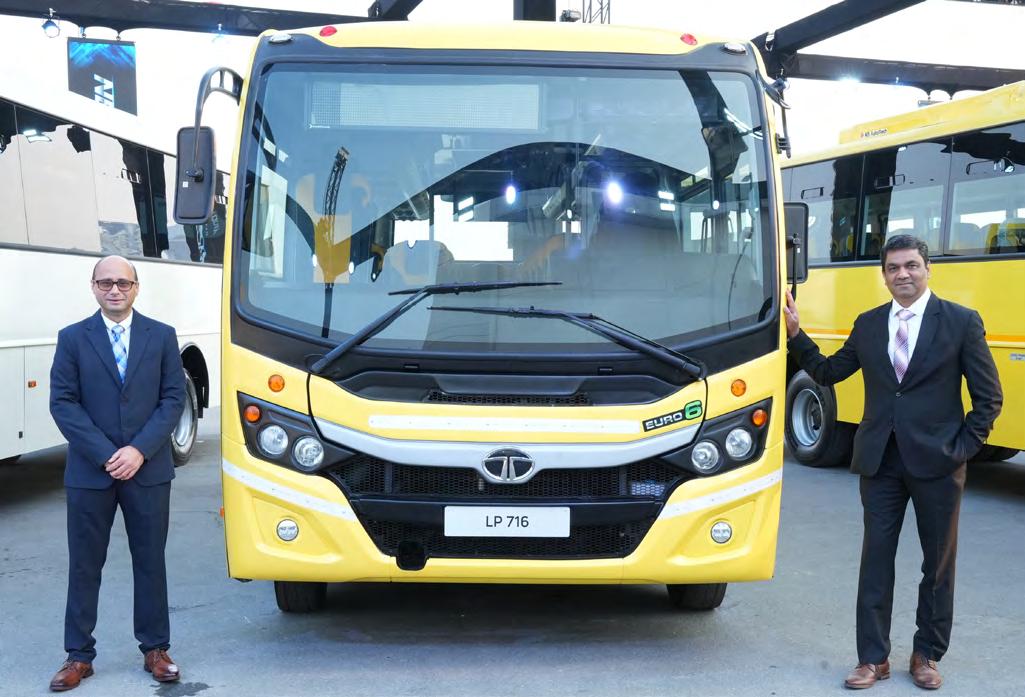
Also, displayed at the event were:
• Prima 4440.S AMT: Auto Shift truck offering fatiguefree, long-haul drive with enhanced driver comfort.
• Prima 4040.T: Blends comfort with productivity. Ideal for water, machinery and logistics transportation
Customer-Centric Services:
• Over 100 strategically Located Service Centres: Region-wide network ensures convenient access to genuine spare parts and timely maintenance support.
• Warranty Coverage: All models come with extended warranty options, offering both peace of mind as well as long-term value.
• Comprehensive Annual Maintenance Contracts (AMC): Customised AMC packages designed to meet varied operational requirements, ensuring optimal vehicle performance and cost efficiency.
Tata Motors offers a wide commercial vehicle portfolio in over 40 countries, spanning sub-1-tonne to 60-tonne cargo vehicles and 9-seater to 71-seater mass mobility solutions. Backed by Tata Motors’ advanced R&D capabilities, these vehicles are robustly engineered and rigorously tested to suit local market requirements.
The move marks the fintech’s first in-market license outside MENA and sets the foundation for a global strategy built on compliance, innovation, and direct connections with diaspora communities.
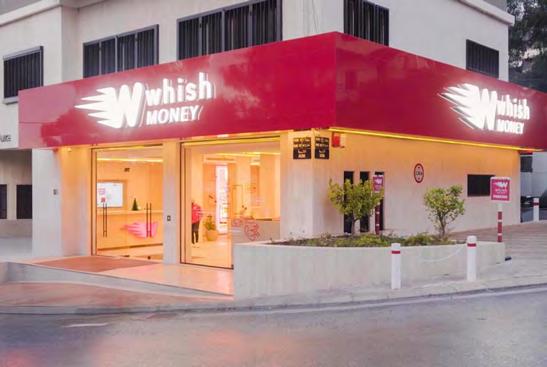
Lebanese fintech Whish Money has secured financial services licenses in Canada, its first major regulatory approval outside the MENA region, signaling the start of a planned global expansion. The company confirmed it is also pursuing licenses in other key markets, including the United States, United Kingdom, the European Union, and Australia.
This strategic move sets Whish Money apart by prioritizing a direct, in-country licensing approach, rather than relying solely on third-party partnerships or limited money transfer agent models. This strategy involves establishing locally incorporated entities and operating fully within national regulatory frameworks, and is designed to build a robust, regulated presence in key diaspora markets.
According to the company, establishing locally incorporated entities allows Whish Money to maintain complete control over the customer
experience while ensuring maximum compliance, security, and transparency in each new market. The Canadian licenses are a crucial first step in this global strategy, providing a regulated foundation for its North American operations.
“Securing our Canadian license is a monumental step that validates our compliant, customer-focused model and sets the foundation for our international expansion,” said Toufic Koussa, chairman of the board at Whish Money. “This move is about more than just entering a new market; it’s about strategically connecting high-diaspora communities with reliable financial infrastructure, beginning with North America. We are committed to building a regulated, transparent global ecosystem that truly serves our users.”
Headquartered in Beirut and regulated by Lebanon’s Central Bank, Whish Money gained prominence locally by providing digital financial services that proved essential during the country’s economic crisis. The company built a large user base of over 1.5 million by offering reliable alternatives for payroll, money transfers, and bill payments when traditional financial channels were constrained.
This global expansion is complemented by Whish Money’s established partnerships with major global players like Visa, Mastercard, Ria, and Terrapay. These alliances strengthen the firm’s secure and compliant cross-border payment infrastructure in the different territories, enhancing financial access for its users. Ultimately, this strategy is part of Whish Money’s long-term goal to evolve from a regional payment provider into a comprehensive global financial ecosystem. By establishing a regulated, in-market presence, the firm aims to build a trusted financial ecosystem connecting communities across borders.

H.H. Sheikh Hamdan has endorsed a series of AI initiatives designed to fast-track the emirate’s technological advancement and enhance digital innovation across government and economic sectors.
H.H. Sheikh Hamdan bin Mohammed bin Rashid Al Maktoum, Crown Prince of Dubai, Deputy Prime Minister and Minister of Defence of the UAE, has approved a new package of artificial intelligence (AI) projects to accelerate the emirate’s adoption of future technologies and advance its digital transformation agenda.
Endorsed during the second 2025 meeting of the Higher Committee for Future Technology Development and the Digital Economy, the initiatives include the AI Infrastructure Empowerment Platform, the Dubai AI Acceleration Taskforce, and the Unicorn 30 Programme—all aimed at reinforcing Dubai’s status as a global innovation hub.
Sheikh Hamdan reaffirmed Dubai’s commitment to becoming the world’s fastest, smartest, and most agile city in adopting future technologies. Guided by the vision of H.H. Sheikh Mohammed bin Rashid Al Maktoum, the emirate continues to strengthen its global leadership in advanced technology, attract top talent, and serve as a hub for innovation, smart governance, and sustainable development.
During the meeting of the Higher Committee for Future Technology Development and the Digital Economy, H.H. Sheikh Hamdan approved the launch of the ‘AI Infrastructure Empowerment Platform‘, designed to enable government entities across Dubai to accelerate the adoption of AI technologies and broaden their application across critical sectors.
The committee also endorsed the establishment of the ‘Dubai AI Acceleration Taskforce‘, aimed at fostering enhanced collaboration among government bodies and aligning their strategic vision to integrate AI applications within a unified framework that supports Dubai’s ongoing digital transformation.
Additionally, H.H. Sheikh Hamdan approved the introduction of the ‘Unicorn 30 Programme‘, developed by the Dubai Chamber of Digital Economy in partnership with 80 local and international companies specializing in entrepreneurship and startup development. The programme’s goal is to fast-track the growth of 30 emerging companies across new economic sectors, enabling them to achieve global “unicorn” status—billion-dollar valuations, originating from Dubai.
When Arman Khederlarian and Bassem Jamaleddine co-founded Maharat, an edutainment hub for masterclasses powered by Arab thought leaders, they set out with a clear mission: to become the go-to platform for anyone across the Arab world who wants to improve their lives, personally or professionally. But beneath the surface of skills and storytelling lies something deeper—an attempt to reclaim Arab narrative, identity, and aspiration.
Co-founders Arman Khederlarian and Bassem Jamaleddine of Maharat created a space where Arab voices, stories, and skills converge, helping people not only improve themselves but also reclaim a sense of identity and aspiration for the Arab world.
“Our vision is for Maharat to inspire and empower everyone to reach their full potential. At the same time, we feel a deep responsibility to preserve and document the wisdom, lessons, and experiences of the Arab world’s most successful and inspiring figures,” Khederlarian says. “We don’t want this knowledge to be lost, we want to make it accessible
for future generations, creating a lasting archive of Arab excellence.” Jamaleddine adds, “On a global level, we’re also driven by the desire to reshape the narrative around the Arab world. For too long, the region has been misrepresented on the world stage. We believe Maharat can help change that by highlighting the incredible talent, innovation, and leadership that exists here, across business, arts, science, and more.”
In addition to democratizing access to the highest calibre of Arab knowledge, experience, and mentorship, Khederlarian and Jamaleddine’s carefully curated, cinematic courses address a critical challenge in education: studies show that individuals forget up to 90% of newly acquired information within a week. “What makes the difference for someone fully internalizing and retaining what they learnt is how

the information is delivered,” Khederlarian explains. “That’s why we focus on bringing the biggest Arab icons and capturing their expertise in cinematic and highly engaging formats - so that we can enable impactful education which is also entertaining and inspiring.”
Since launching in 2023, Maharat has released eight masterclasses featuring the likes of Brands For Less founder Toufic Kreidieh, Syrian actor Kosai Khauli, Lebanese singer Ragheb Alama, Palestinian chef Salam Dakkak, and celebrity stylist Cedric Haddad. The platform has attracted a global audience, with users from over 100 countries. Its digital presence includes more than 200,000 social media followers, over 1.5 million unique website visitors, and upwards of 100 million online impressions.
Each Maharat masterclass is a deeply personalized and thoughtfully curated experience, tailored closely to the strengths and unique journey of the
instructor. The co-founders highlight that Maharat does not deliver generic academic content, but that their team works hand-in-hand with every instructor to ensure their masterclass reflects their expertise, lessons learnt, and real-world insights. “From a production standpoint, we’ve fine-tuned a highly efficient and professional process,” Khederlarian says. “Thanks to our robust pre-production processes, each masterclass is typically filmed over just one to two days, with instructors arriving fully prepped. The final masterclass is usually one to three hours long, broken down into bite-sized chapters that each focus on a specific, practical lesson, making the content impactful and easy to apply.”
Jamaleddine adds that each Maharat masterclass goes beyond surface-level advice, delivering both practical skills and meaningful personal stories from some of the Arab world’s most influential figures. “Our goal is for users to walk away not only with a solid understanding of the subject, but also with


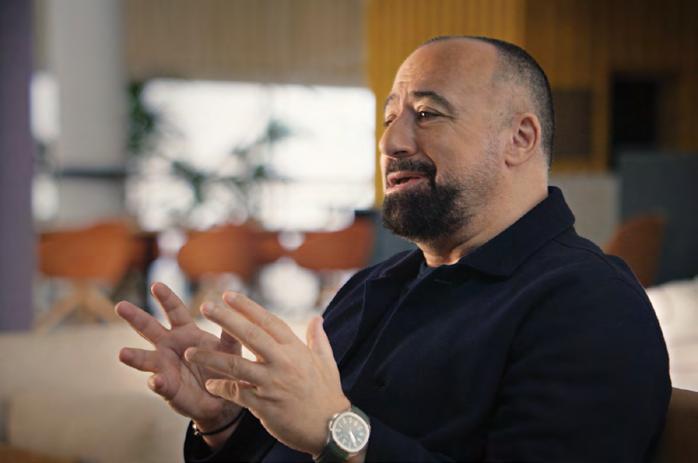
actionable tools they can apply in their careers or creative pursuits,” he says. The selection process is rooted in one non-negotiable principle: every instructor must be among the very best in the Arab world in their field. Khederlarian explains that an instructor may qualify in a number of ways. “They could be a household name or major celebrity, they could represent a well-respected brand or institution, or they may be an individual who has achieved remarkable success in their industry, even if they’re not widely known to the public. What matters is that they are the best possible person to teach the topic, and that their voice resonates authentically with our audience.”

The preparation phase typically lasts between 2 to 4 weeks, depending on the instructor. During this period, the Maharat team conducts a series of collaborative planning sessions to develop a masterclass that reflects the instructor’s unique perspective and expertise. “Our internal team of researchers and writers works behind the scenes to align the content with audience interests, focusing on delivering personalized, storydriven, and practical learning experiences,” Jamaleddine says.
Maharat was initially bootstrapped by its co-founders,
who invested personally in the early stages to bring the concept to life. After developing a clear strategy and business plan, the platform secured initial support from a group of angel investors at the idea stage. Following the production of the first masterclass, Maharat went on to raise several million dollars in funding from prominent venture capital firms, strategic family offices, well-known regional figures, and experienced angel investors from across the Arab world and beyond.
Speaking of their future goals, Jamaleddine says, “First, to
continue growing our content portfolio across diverse and indemand topics, so that Maharat becomes the go-to platform for personal and professional development in the Arab world. Second, to scale our user base to positively impact the lives of as many people as possible. And third, to roll out a major B2B strategy, partnering with forward-thinking businesses and government entities to offer Maharat as a learning and development tool to benefit their teams while also being aligned with national and organizational goals and objectives.” Instructor names are not disclosed prior to

the official launch of each masterclass, in line with confidentiality agreements and to maintain an element of surprise for users.
However, Khederlarian notes that there are several dream instructors the team aspires to feature in future masterclasses. “As football fans, Mohamed Salah would be incredible, not just for his talent on the pitch but for the inspiration he represents to millions across the Arab world,” he says. “In the business world, icons like Mohamed Alabbar have shaped the region’s economy and would offer so much value. We’d also love to spotlight extraordinary Arab women such as Lubna Olayan, who’s been a trailblazer in both leadership and impact.” Having grown up in Lebanon, Khederlarian and Jamaleddine have witnessed firsthand the transformative impact of education and upskilling.
“We observed how individuals from underserved backgrounds were able to significantly improve their lives and those of their families by pursuing education and acquiring valuable skills that led to meaningful career opportunities,” Khederlarian
says. “Education is not a luxury; it’s a fundamental right and everyone, regardless of background, should have access to the highest quality education possible because that’s what enables people to realize their full potential, change their lives for the better, and contribute meaningfully to the world.”
When it comes to what defines Arab achievers across industries, Jamaleddine points out to resilience. “While resilience is a trait shared by successful people everywhere, in the Arab world it carries even more weight,” he explains. “Many people in the region face difficult social and economic realities, yet they continue to move forward with quiet strength, holding on to their goals with resilience, self-belief, and dedication. These soft skills, like perseverance and confidence, are often the true keys to lasting success. And through Maharat’s inspirational content, we aim to instill this mindset in everyone. We want viewers to not only learn practical skills but also develop the mental strength and confidence to overcome their own challenges, just like the icons they admire.”
These soft skills, like perseverance and confidence, are often the true keys to lasting success. And through Maharat’s inspirational content, we aim to instill this mindset in everyone. We want viewers to not only learn practical skills but also develop the mental strength and confidence to overcome their own challenges, just like the icons they admire.”
Plus, Jamaleddine adds, the Arab world cannot be represented through a single lens—it is shaped by a rich tapestry of perspectives, ideologies, and experiences. “We believe it’s crucial to foster mutual understanding and appreciation across these differences, to encourage people to listen to each other, respect varying viewpoints, and see diversity as a strength,” he says. “That’s something we’re committed to highlighting through Maharat: that bringing together different voices and perspectives creates a richer, more connected, and more empowered Arab world.”
With professional experience rooted in corporate environments, the co-founders were accustomed to structured planning, clear strategies, and predictable outcomes. However, launching Maharat as their first entrepreneurial venture revealed the distinct challenges of the startup world. “One of the biggest lessons we’ve learned is that no matter how detailed your plan is, you need to be prepared for constant change,” Khederlarian says. “There’s a quote by Mike Tyson that captures it perfectly: ‘Everyone has a plan until they get punched in the mouth.’ And that’s exactly what entrepreneurship feels like at times.”
Jamaleddine adds, “You have to stay agile, think on your feet, and adapt in real-time to what the
market throws at you. It’s not enough to plan, you must be hyper-aware of your environment, ready to react, problem-solve, and let go of initial ideas when needed. Being overly attached to a single approach or perspective can hold you back. Flexibility, objectivity, and a solution-oriented mindset are essential for navigating this unpredictable space.”The Maharat journey has shown that entrepreneurial success isn’t about perfect planning but about continuous evolution—and that is what Arman Khederlarian and Bassem Jamaleddine have embraced every step of the way. By combining strategic thinking with adaptability, they’ve built a platform that not only reflects the richness of the Arab world but also redefines how knowledge is shared across it.

Real estate transactions are already complex. Does Blockchain make them even more difficult or ease the process?
In a region where innovation often moves faster than regulation, the Middle East—particularly the Gulf—has never shied away from embracing the bold, the disruptive, or the futuristic. From driverless taxis to AI-driven smart cities, the GCC has earned its reputation as a testbed for tomorrow. And now, another disruptive force is working its way through the region’s real estate sector: blockchain.
At first glance, blockchain— the digital ledger technology best known for powering cryptocurrencies like Bitcoin— might seem an unlikely match
for the conservative, documentheavy world of property. But beneath the buzzwords lies a tool with the potential to address some of the most persistent inefficiencies in real estate: lack of transparency, fraud-prone paper trails, prolonged transaction times, and fragmented ownership records. For a sector that touches everything from sovereign investment to suburban apartment rentals, the implications are profound.
In the Gulf, where real estate is a cornerstone of national economic strategies, the integration of blockchain is

Laila El-Haddad, Award-winning Palestinian author, social activist, policy analyst and journalist
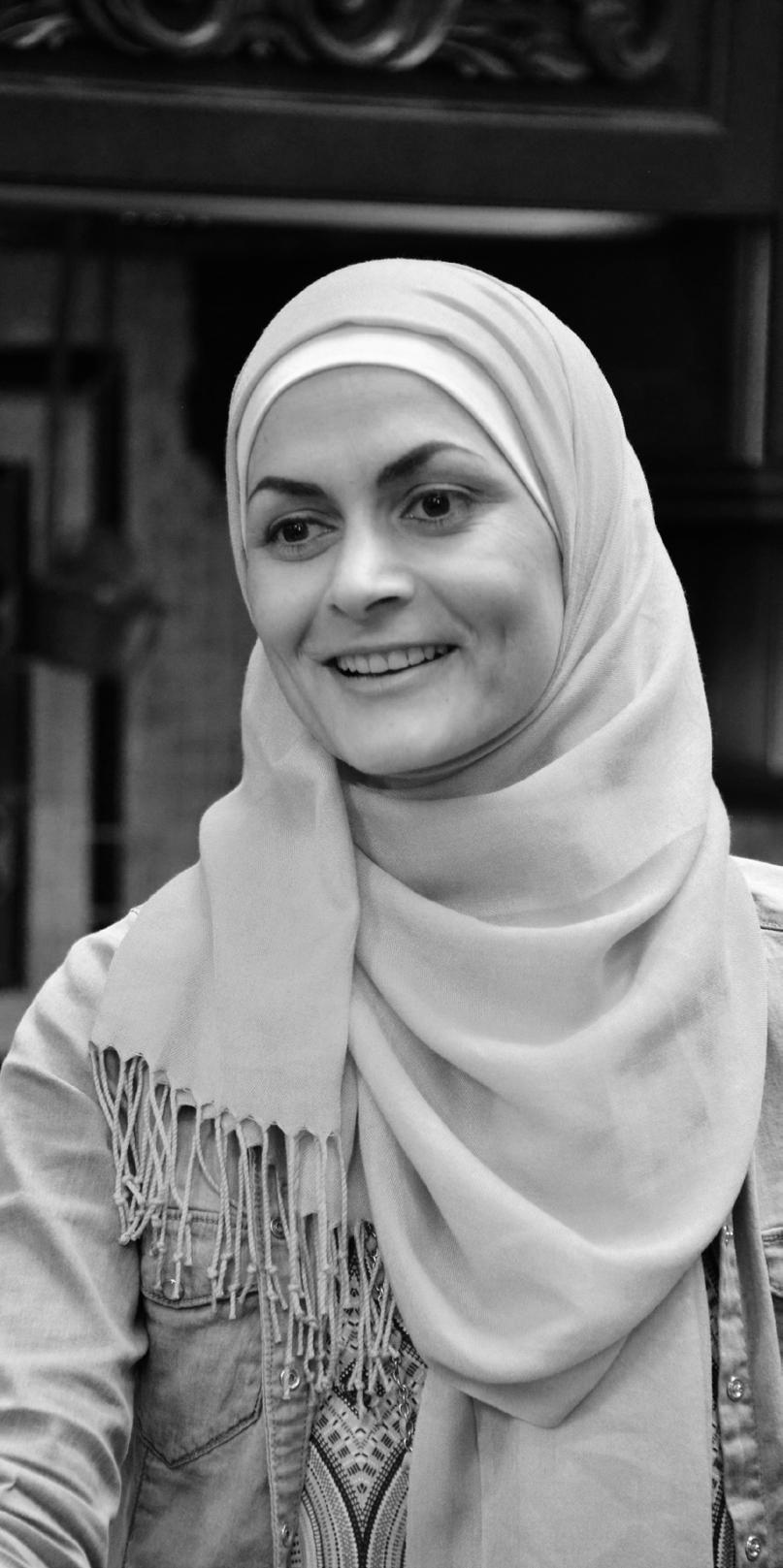
not a theoretical exercise. Governments, developers, and tech firms are already testing its limits. What’s emerging is a picture of a market cautiously but deliberately laying the groundwork for a more digital, more secure, and more frictionless real estate ecosystem.
Real estate transactions in the Gulf are notoriously complex. Multiple layers of approvals, notaries, escrow processes, and manual verification can stretch what should be a straightforward sale into a bureaucratic labyrinth. In many jurisdictions, property title verification still relies on paper archives or siloed databases that aren’t easily accessible to the public. This opacity can increase the risk of doubleselling, title fraud, or delayed handovers—all of which undermine investor confidence.
Blockchain offers a direct remedy. At its core, it is an immutable digital ledger that records transactions in a decentralized system. Once a transaction is added to the blockchain, it cannot be altered or erased. That permanence makes it ideally suited to property records, where trust and
clarity are paramount. When property deeds, ownership changes, and title histories are recorded on blockchain, verification becomes nearly instantaneous. There’s no need to chase paperwork or cross-reference archives; the information is secured, transparent, and tamper-proof.
Several governments in the Gulf are already exploring this use case. The Dubai Land Department (DLD), often a first mover in real estate innovation, launched its blockchain strategy as early as 2017. Since then, it has worked with local partners to digitize tenancy contracts, link property records to utility accounts, and even test smart contracts—selfexecuting digital agreements that release payments or ownership once certain conditions are met. By moving these traditionally paperbased functions onto blockchain, the DLD aims
to create a “fully digital real estate market” in line with Dubai’s ambitious paperless government initiative.
The results are starting to show. Today, landlords in Dubai can register lease agreements through blockchain-integrated portals, automatically linking tenancy details to DEWA (Dubai Electricity and Water Authority) and other service providers. This not only streamlines the rental process for residents and owners alike, but also strengthens the city’s data ecosystem. As more property transactions are logged on blockchain, regulators gain better visibility into market activity—enabling more informed policy decisions and early identification of speculative bubbles.
Beyond public registries, blockchain is also transforming private sector workflows. Developers and brokers are using it to enhance trust during off-plan sales, where buyers traditionally worry about escrow mismanagement or project delays. With smart contracts, a buyer’s payment can be programmed to release to a developer only when agreed milestones are met—such as the completion of a foundation or structural works. This conditional flow of funds reduces risk on both sides and fosters accountability without the need for an intermediary.


One of the most compelling promises of blockchain in real estate is its ability to fractionalize ownership. In traditional models, owning a property requires substantial capital and navigating a host of legal and logistical hurdles. But blockchain makes it possible to tokenize real estate assets—dividing a property into digital shares that can be bought, sold, or traded like stocks. These tokens represent ownership rights, and because they
live on the blockchain, their provenance and value can be easily verified.
This concept has exciting implications in the Gulf, especially for attracting retail and foreign investors. A young professional in Singapore, for example, could own a fraction of a Dubai apartment and receive rental income from it—without ever stepping foot in the UAE. Bahraini pension funds could diversify portfolios by
acquiring digital stakes in Riyadh office buildings. For developers, tokenization opens new funding channels. Instead of seeking one large investor, they can raise capital from a distributed pool of micro-investors worldwide.
Of course, the idea of tokenized real estate is still in its infancy. Legal frameworks around ownership, custody, taxation, and crossborder transferability vary
widely across jurisdictions. Regulators in the GCC have responded with cautious optimism. Bahrain’s Economic Development Board has made early moves toward blockchain regulation, while the Abu Dhabi Global Market (ADGM) and Dubai International Financial Centre (DIFC) are studying tokenized securities with an eye toward compliance and investor protection. The UAE’s Securities and Commodities Authority (SCA) has also issued guidance on digital assets, a necessary first step before real estate tokens can be traded at scale.
Despite the enthusiasm, challenges remain. One of the biggest is interoperability— how blockchain platforms integrate with existing legal and regulatory systems. In many Gulf countries, property laws are based on civil or Islamic legal traditions that weren’t built with decentralization in mind. Updating these frameworks to recognize blockchain-based records as legally binding titles or to allow smart contracts to replace notaries requires careful reform.
There’s also the question of accessibility. While blockchain promises efficiency, its current interfaces can be technically intimidating. Mass adoption will depend on user-friendly platforms that abstract away
the complexity. It must be just as easy for a landlord in Muscat or a buyer in Jeddah to complete a transaction on blockchain as it is to sign a traditional contract—ideally easier.
Security, too, is a doubleedged sword. Blockchain’s immutability is a powerful safeguard, but it also means mistakes are permanent. A smart contract coded incorrectly or a wallet key lost forever can result in irretrievable assets. As blockchain use increases, so will the need for clear dispute resolution mechanisms, digital identity standards, and robust consumer protections.
Still, for all its complexities, the momentum is unmistakable. The region’s real estate sector is evolving—and blockchain is part of the blueprint. As more governments and developers digitize their workflows, early adoption will likely give way to mainstream integration. Future buyers may not walk into a brokerage office, but log into a platform, browse blockchaincertified properties, and complete transactions with a few biometric scans. A rental agreement might be signed, registered, and linked to utility accounts in minutes—all without paper or in-person verification.
In this future, title fraud

becomes virtually impossible. Middlemen are reduced or redefined. Transparency is the norm, not the exception. And the property market becomes not just smarter, but more accessible, efficient, and trusted.

In the words of Laila Al Haddad, a technology advisor to several Gulf property developers, “Blockchain won’t replace the real estate industry—but it will reshape how the industry operates. It’s not just about
speed or savings. It’s about building trust at scale.”
And trust, in a sector as foundational as real estate, may prove to be blockchain’s greatest legacy.
He moves 18 countries, and a billion expectations. Abdulaziz Busbate, CEO, DHL Express MENA, on leadership that outpaces the landscape
The Middle East and North Africa are not just a region; they’re a living, breathing challenge. Dynamic, layered, full of contradictions and untapped possibilities. Leading DHL Express across 18 countries and over 5,800 people, Abdulaziz Busbate embodies a rare mix of bold vision and grounded humanity. In this candid conversation, he reveals what it truly means to lead in times of seismic change: to embrace complexity as

opportunity, to put people at the heart of technology, and to empower a generation ready to take the reins. This is not a story of logistics as usual, it’s a story of transformation, resilience, and purpose.
You’ve stepped into the CEO role just as logistics is being redefined. What’s the biggest shift you believe the industry and the region is about to see?
We are seeing three major shifts. First, technological advancements like AI and automation are streamlining warehousing, routing, and customer experience in ways we couldn’t imagine a few years ago.
Second, sustainability is becoming non-negotiable. Clients now expect green solutions from their suppliers, and governments are introducing regulations to enforce carbon efficiency and waste reduction.
We are also seeing a shift in the region’s economic portfolio, with countries like Morocco and the UAE emerging as stronger logistics and trade hubs as they diversify their economies.
Leading such a diverse region must come with its own challenges. How do you manage 18 countries and over 5,800 people under one brand? You lead it by staying close to your people. Leadership at scale is all about trust, alignment, and empowering teams to act with purpose. We may span 18 countries, but our teams are deeply rooted in their local markets. That local intelligence is our strength.
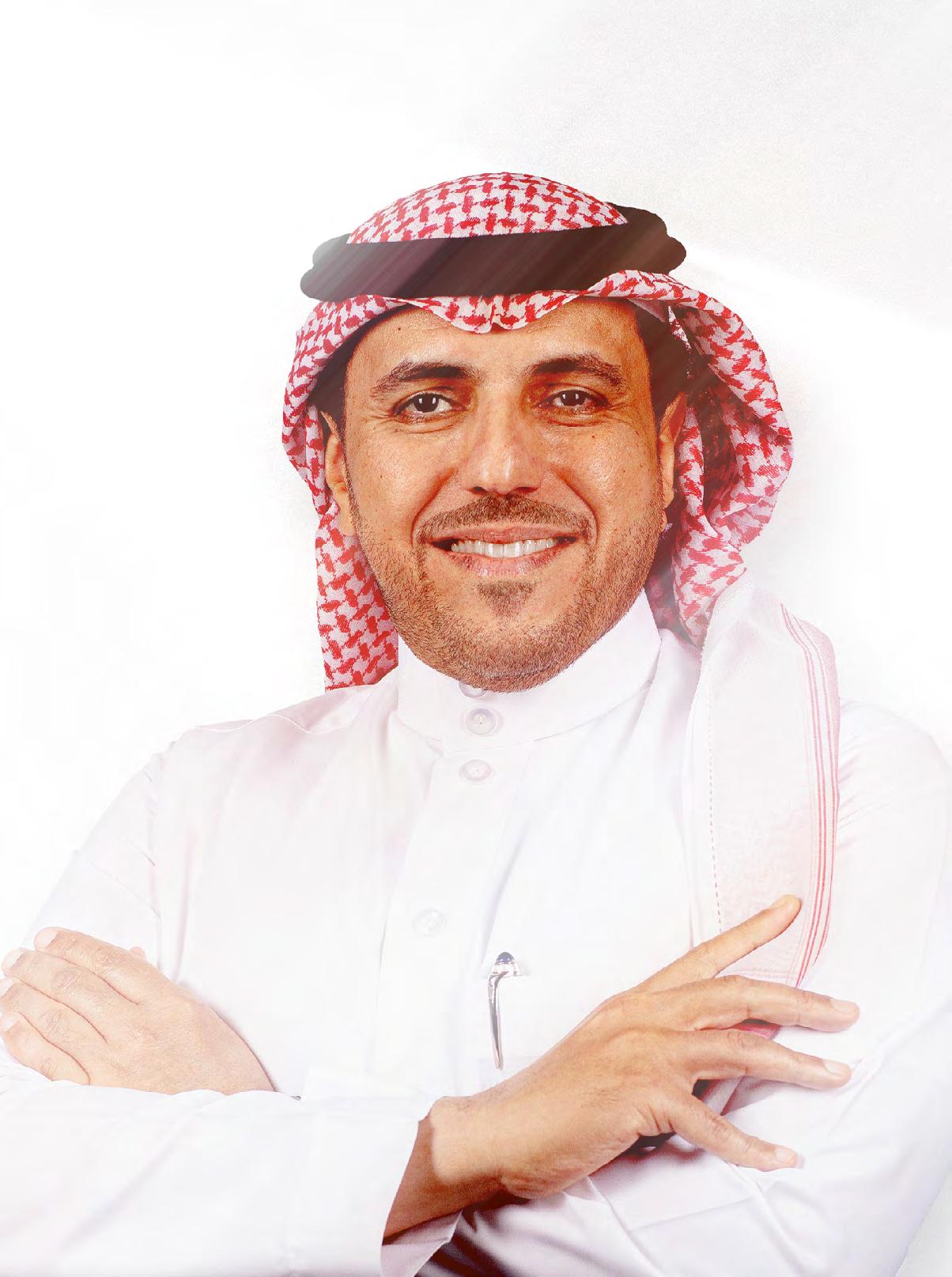
My job is to set the tone with clear direction, strong values, and a shared belief in why we do what we do. That’s how you maintain consistency without being rigid. DHL has an incredible culture of performance and pride, and I work closely with my team to protect and amplify this culture.
Looking back at your career, from managing Bahrain to leading Saudi Arabia and now the entire MENA region, what were the key moments or decisions that prepared you for this role?
Taking on the role of Country Manager in Bahrain in 2015 was a turning point. It gave me exposure beyond a single market as I gained a deeper understanding of our regional network, our infrastructure, and how the business operates across borders. I later applied that perspective in Saudi Arabia, where we restructured our office in Riyadh and expanded our footprint to better serve both local and international demand. That decision was a key step in preparing for broader regional responsibilities.
DHL’s history is one of dominance, but staying disruptive requires agility. How do you ensure DHL remains ahead in a fast-changing industry? We stay disruptive by staying close to our customers. In logistics, demand patterns are constantly changing, and if you are not vigilant, you will already be behind. Our role is to understand those changes as they happen and act accordingly.
A notable example is what we experienced during the COVID pandemic. We saw a sharp shift from B2B to B2C as consumer behaviour changed. This required us to quickly expand our last-mile capacity, reconfigure delivery routes, and adjust our staffing models to

meet the rising demand for residential services. Now, with B2B growing again, we are recalibrating by investing in speed and reliability for business shipments.
We make it a point to continuously assess our network setup, realign it with customer expectations, and adjust it based on what the market requires.

When people talk about MENA, they often talk about complexity. What do you see instead? untapped potential, or underestimated markets? MENA is undoubtedly complex geopolitically, economically, and operationally. However, we view complexity as a source of opportunity.
This is a region where adaptability is a requirement, and that is where our teams excel.
More importantly, many markets across MENA remain underestimated. We are witnessing growth in intra-regional trade, renewed investment flows, and an increasing demand for faster and more reliable logistics. These are signals of untapped potential. With the right setup and
strong local teams, we are well-positioned not just to manage complexity but to grow through it.
You’ve touched on sustainability as a major shift, but beyond strategy decks, what does meaningful, measurable progress actually look like across your operations? Sustainability is one of our core global pillars, and we are aligning our operations and infrastructure in the region to reflect that. We have already made progress on several fronts. We are using Sustainable Aviation Fuel (SAF) as part of our air operations. A portion of our forklifts has shifted to electric models. We have also installed solar panels across key facilities to reduce our energy consumption.
Embedding sustainability is an ongoing process, and I won’t say we are done. But the important thing is that the mindset is shifting. The region as a whole is moving in the right direction, and we are committed to being part of that change.
At the same time, automation and AI are transforming logistics at high speed. How do you ensure innovation supports your workforce rather than sidelining it?
We see technology as an enabler, not a substitute for our people. While we keep pace with the latest advancements in AI, automation and digitalisation, we approach every innovation with the emphasis that it should enhance our workforce, not displace it.
Where we are integrating technology is in areas that benefit from greater efficiency, such as automating manual or repetitive processes in our operations. In doing so, we are freeing up our teams to focus on higher-impact tasks, while creating a more efficient and scalable network.
With so much change happening across geopolitics, trade routes, and customer demands, what’s the pressure point that keeps you up at night? And what’s the spark that keeps you moving forward?
What motivates me is our people. I am proud to work with such a strong and capable team across the region. I trust them fully, especially those on the ground, who carry the responsibility of keeping our operations running day in and day out.
What keeps me up at night are securityrelated concerns, especially cyber threats and situations that might put our people at risk. In a region like ours, things can shift quickly. My first priority is always their safety, ensuring that whatever happens,

our people remain safe and sound – both at work and at home. That is a responsibility I take very seriously.
If we put DHL Express MENA five years into the future, what headline do you hope we’re writing about the business under your leadership?
I would like the headline to read: “DHL Express MENA Achieves Full Regional Coverage, Powered by Next Generation of Local Talent.”
That is the direction we have committed ourselves to. Our focus remains on expanding our reach across every corner of the region, with no gaps or underserved markets. But growth alone is not the goal. What matters more importantly is who drives that growth.
I believe the progress of this sector lies in empowering the next generation. We need to bring in fresh talent that thinks differently, challenges the norm, and brings new energy into the organisation. At the end
of the day, this is their region, and their company. Our role is to create the space for them to lead, and the responsibility to deliver should sit with those who know their markets.
Abdulaziz Busbate’s leadership is defined by something rare in today’s world: genuine care for the people behind the business. Leading thousands of team members, he understands that progress isn’t built on systems alone but on trust and connection in those who do the work every day.
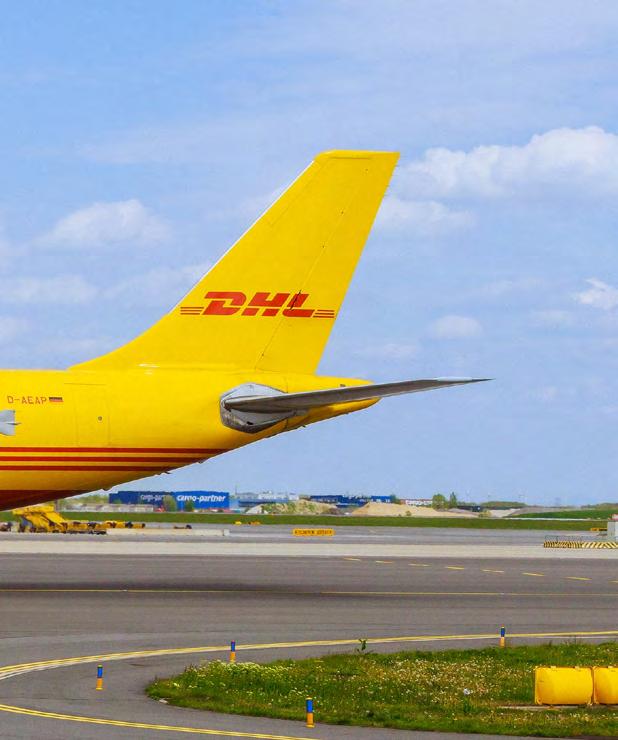
In a fast-moving place like MENA, he knows that real strength comes from leaning into uncertainty and giving people the freedom to adapt and grow. For him, leadership means creating space for others to step up and to take ownership, to challenge the status quo, and to drive change with passion and purpose.
At its core, this isn’t just a story of logistics, it’s a story of people. Of how one leader’s belief in his team transforms complexity into opportunity, and how that shared momentum is shaping the future of an entire region.
“Over the years, I’ve learned a few things that have stayed with me. First, always be fairwith yourself, your team, and the company. Fairness is part of our culture at DHL, and when you adopt it naturally, it shapes how you lead.
Second is developing people - listening and effective communication are essential for progress and helping others grow alongside you.
Third, be honest and transparent.
And finally, respect matters. Treat people with respect, and you’ll see it come back to you in trust, performance, and results.”
For Chema Basterrechea, hospitality is more than service, it’s a philosophy. As COO of Radisson Hotel Group, he’s leading a bold evolution where global reliability meets local authenticity, redefining what it means to feel at home across continents, cultures, and communities.

By Aalia Mehreen Ahmed

When a brand operates across 100 nations, offering consistent quality undoubtedly becomes paramount. That sentiment perhaps becomes doubly significant –and complex– when it applies to a hospitality brand. Yet the Radisson Hotel Group has unlocked a seemingly straightforward approach to championing such large scale operations. “Operating in more than 100 countries means we must simply, consistently, deliver our “Every Moment Matters” guest promise—everywhere, but with a local slant,” says Chema Basterrechea, Global President and COO at Radisson Hotel Group. “The Group’s 10-brand architecture ensures

consistency, while our flexible standards empower hotels in Riyadh, Dubai, or Doha to reflect regional culture through F&B concepts, design, and service rituals. This “glocal” approach combines global systems and service ethos with local adaptation. For example, our Guan Xin program caters specifically to Chinese travelers, while in the Middle East, we tailor meeting solutions and food offerings to align with cultural and business practices. This balance strengthens guest loyalty and ensures relevance across diverse markets.”
Indeed, it is through this approach that the Radisson brand, one of the world’s largest hotel groups has managed to operate a diverse portfolio of brands across luxury, upscale, midscale, and economy
HOSPITALITY IS MOVING TOWARDS DIGITAL-FIRST JOURNEYS, SUSTAINABLE OPERATIONS, AND EXPERIENTIAL TRAVEL- BY 2030, HOTELS WILL SERVE AS MULTI-USE LIFESTYLE HUBS THAT BLEND WORK, LEISURE, AND COMMUNITY. “
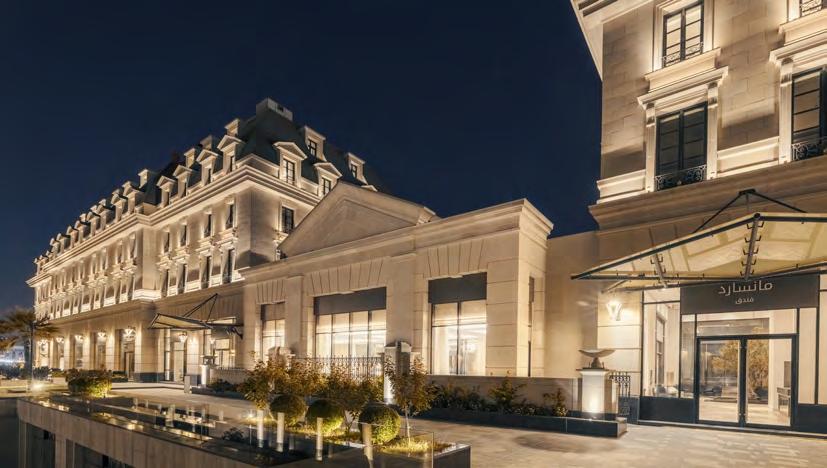
segments. With more than 1,00+ hotels in over 100 countries, Radisson Hotel Group has a strong footprint in Europe, the Middle East, Africa, and Asia-Pacific, with growing expansion in the Americas and China. Globally, Basterrechea reveals, the company has delivered 41.5% Gross Operating Profit margins, supported by The Club—the brand’s revenue management hub that covers a whopping 335 hotels—and advanced distribution systems that have maintained a consistent Revenue Generation Index [a metric used in the hotel industry to compare a hotel’s revenue performance against the market average] of above 100 for 30 consecutive weeks.
At the heart of such expansive operations lies the knack of adopting efficient strategies, Basterrechea notes. “In MENA, we’ve achieved cost savings and improved sustainability by centralizing procurement and upgrading energy efficiency,” he says. “A standout example is the Radisson Blu Dubai Deira Creek, which features an awardwinning thermodynamic solar system for hot water, significantly reducing operating costs. Additionally, in today’s always-on, connected world where brands can go viral, trend, and lose relevance within days if not hours, visibility, trust, and relevance are also extremely important.”
It is this combination of efficiency and building trust that has stood Radisson Hotel Group in good stead for over 75 years across the globe. “The Radisson Hotel Group portfolio spans more than 1,580 hotels in operation and under development,” Basterrechea continues. “Of this, Radisson Blu remains the largest upper-upscale brand in Europe for 13 years while Radisson has become the fastest-growing upscale brand globally, excluding China. We build awareness through our digital platforms, specifically our website and app, which is the fifth most-downloaded hotel app in the world, with content in 34 languages, and through experiential projects such as Radisson+, which offers online check-in and check-out and instant messaging, and our AI-powered Radisson Meetings Dream Machine, which allows event professionals to create visual representations of event spaces. This dual strategy allows Radisson Hotel Group to stand out in mature markets while gaining first-mover advantage in emerging markets like Saudi Arabia and North Africa.”
Such levels of innovation have, of course, been made possible through a rigorous permeation of techdriven tools. Radisson Hotel Group’s endeavors in this regard have received multiple accolades, the most recent of which was winning the “Best Digital Transformation, Leading Hotel Group” at the Leaders in Hospitality Awards 2025 by Hotel & Catering [a publication under BNC Publishing, the media house behind Business Today Middle East]. “Technology is transforming every touchpoint of the guest journey, which is why that particular recognition was an extremely proud moment,” Basterrechea says.
WE BUILD AWARENESS THROUGH OUR DIGITAL PLATFORMS, SPECIFICALLY OUR WEBSITE AND APP, WHICH IS THE FIFTH MOST-DOWNLOADED HOTEL APP IN THE WORLD, WITH CONTENT IN 34 LANGUAGES, AND THROUGH EXPERIENTIAL PROJECTS SUCH AS RADISSON+, WHICH OFFERS ONLINE CHECK-IN AND CHECK-OUT AND INSTANT MESSAGING, AND OUR AI-POWERED RADISSON MEETINGS DREAM MACHINE, WHICH ALLOWS EVENT PROFESSIONALS TO CREATE VISUAL REPRESENTATIONS OF EVENT SPACES.
- CHEMA BASTERRECHEA
“Some of the key innovations that have brought us this title include the aforementioned Radisson+, which offers online check-in and check-out, instant messaging, and digital concierge; our interactive content, where guests can virtually enter hotels, rooms, and meeting spaces from their laptops, mobile phones, or VR headsets, before booking; and AI-powered Radisson Meetings Dream Machine, which enables event planners to design immersive events using generative AI. We also introduced a more personalized Radisson Rewards program, which now boasts over 24 million members and has a dynamic redemption model that allows guests to access their benefits immediately and advance to the highest tier twice as fast.”
A combination of all of the above operational approaches have allowed Radisson Hotel Group to continue with its geographical expansion plans as well. “In 2025, our expansion has focused on high-growth geographies, including Saudi Arabia, the UAE, and India, amongst others,” Basterrechea elaborates. “In the Middle East, Vision 2030 investments in Saudi Arabia are a catalyst for hospitality growth, and Radisson has already signed multiple new projects in Riyadh. This does not mean we will not continue to focus on other regions, such as Africa, where we delivered the most hotel openings in 2024, with 50% net operating growth over the last five years.”
Strengthened by the brand’s success so far, and a stringent sustainability policy,
Basterrechea now looks forward to what the future holds for the brand. “Hospitality is moving towards digital-first journeys, sustainable operations, and experiential travel- by 2030, hotels will serve as multiuse lifestyle hubs that blend work, leisure, and community,” Basterrechea observes. “In addition to our advances in technological innovation to provide a greater guest experience, Radisson Hotel Group is committed to Net Zero by 2050, with published approved Science Based Targets. We’ve also opened our first two Verified Net Zero Hotels in Manchester and Oslo this year. Parallel to this, our Hotel Sustainability Basics (HSB) is set to be fully rolled out by the end of 2025, with 100% of our hotels meeting sustainability criteria. In the Middle East, where sustainability is now part of national visions, Radisson Hotel Group is positioned to be a trusted partner for governments, investors, and guests.”

Known for its “Every Moment Matters” guest promise, Radisson Hotel Group combines global standards with local adaptation thereby championing a true “glocal” approach
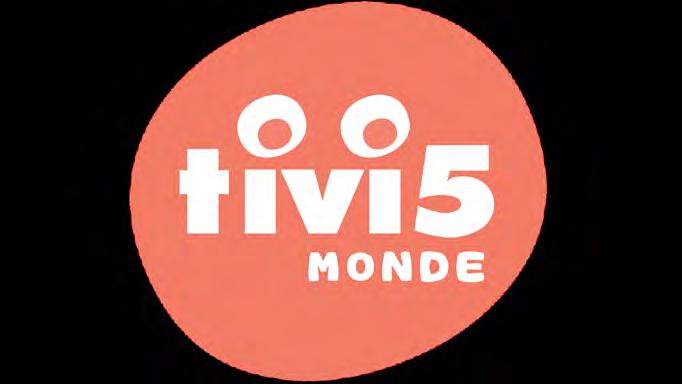






News, cinema, documentaries, sport, cartoons...
Every family member’s show “en français” for free

Subtitled in Arabic


ALWAYS MORE TO DISCOVER
Sean Heckford, Director of Built Asset Consulting at Cavendish Maxwell, explores how visionary design, sustainability, and evolving ownership laws are transforming Saudi Arabia’s urban landscape.

With Saudi Arabia set to implement a landmark foreign ownership law in January 2026, the country’s real estate sector stands at the threshold of significant transformation. For decades, access to property markets was primarily reserved for Saudi nationals, but this new legislation promises to open the gates to a broader demographic, unlocking demand from expat end-users and international investors, particularly in key urban centres.
According to Cavendish Maxwell’s latest insight, the impact is already taking shape. In the first half of this year alone, Riyadh recorded 35,600 real estate transactions, a 10% increase year-on-year, while Jeddah saw 15,200 sales, marking a 25% rise. The sharpest short-term response is expected in Riyadh, thanks to its strong white-collar base, the ongoing development of giga projects, and the steady influx of Regional Headquarters. Targeted waterfront zones in Jeddah are also poised for high interest.
The law is likely to disrupt market structure and competition in multiple ways. International developers and asset managers are expected to enter the scene, often partnering with local players, especially for large-scale mixed-use schemes and branded residential offerings. As zoning regulations
and investor rights are clarified, both mortgage and REIT markets are expected to deepen.
Crucially, the government is establishing policy guardrails to maintain market stability. Measures such as zoning caps, project timelines, and minimum capital requirements for commercial ventures are designed to discourage speculation while supporting affordability goals.
This could lead to a twotier pricing structure: one in foreign-accessible zones with a premium, and another in traditionally restricted areas where pricing may remain stable. Already, monetary policy appears to be working in favour of this transition. The Saudi Central Bank recently cut its key rates by 25 basis points, with the Repo rate now at 4.75% and the Reverse Repo at 4.25%, aligning with global monetary easing trends. Cavendish Maxwell forecasts further easing through to 2026, potentially lowering rates to around 4.35%, enhancing financing conditions just as the new law takes effect.
In tandem, Crown Prince Mohammed bin Salman has introduced a five-year rent freeze in Riyadh for both residential and commercial properties. This stabilisation measure is aimed at protecting tenants during this period of real estate liberalisation, and could be extended to other cities in due course.
Sustainability and ESG in Saudi Housing: From Policy to Practice
Amidst the policy shifts, sustainability and ESG (Environmental, Social, Governance) compliance are also becoming central to the country’s housing development agenda. Codes are no longer aspirational; they’re mandatory and enforceable.
The Saudi Green Building Code (SBC 1001, 2024) is now in full effect, working in conjunction with the energy codes (SBC 601/602) to embed green practices into all new developments. The Saudi Energy Efficiency Centre (SEEC) has issued binding guidance on residential energy performance, covering insulation, lighting, HVAC, and hot water systems. It now requires an Energy Consumption Intensity certificate for every listed property, enhancing transparency for both buyers and renters.
Thermal insulation is mandated for new builds, supported by technical documentation embedded in the Saudi Building Code.
At the project level, major developments such as NEOM and THE LINE are setting a precedent. These giga-projects are designed as 100% renewable, low-carbon cities, and this ethos cascades down into their subdistricts through district cooling, sustainable transport-first plans, and greywater reuse.

Elsewhere, MoMRAH is advancing green certifications such as Ajwad, while initiatives like Green Suburbs are starting to appear in new housing launches and municipal planning KPIs. Developers like ROSHN are already earning top-tier certifications, including Mostadam Diamond, for sustainable project delivery.
Commercial relevance is equally important. Access to global capital, including green loans and sustainabilitylinked bonds, is increasingly dependent on ESG alignment. Cavendish Maxwell has observed how Saudi Arabia’s urban programmes are aligning with these sustainable finance frameworks, offering compliant developers a distinct advantage in cost of capital.
Saudi Arabia’s Vision 2030 continues to define the direction of the residential market. With a target of 70% Saudi homeownership by 2030, state-linked organisations such as the National Housing Company, ROSHN, and a host of private partnerships are spearheading the delivery.
The Housing Programme reported a 64% homeownership rate by the end of 2023, with platforms like Etmam, a one-stop home ownership solution, and Sakani, which focuses on affordable housing, streamlining the process for Saudi nationals.
Developers are aligning their strategies accordingly. Largescale, amenity-rich, masterplanned communities are now the norm. With ROSHN’s multi-city pipeline, price points are calibrated to cater to the mid-market, in line with national housing goals. Phased delivery is also tied closely to infrastructure deployment.
Riyadh’s major pipeline projects, such as Diriyah, New Murabba, and Sedra, alongside upcoming Jeddah projects like Jeddah Central and ROSHN Al Arous, are set to shape housing supply through 2030.
Financing innovation is also on the rise, with subsidised mortgages, off-plan safeguards, and industrialised construction techniques reducing delivery timelines while meeting performance standards required by updated building codes.
Vision 2030 is not just about housing, it’s about smart urbanism. Pioneering developments like THE LINE are serving as templates for what Saudi Arabia refers to as “cognitive communities,” where 90% of real-time data is analysed to optimise every layer of urban life. This model is already influencing infrastructure, utilities, and residential design in other districts across the Kingdom.
PropTech is playing a crucial enabling role. Digitised property platforms and registries, such as the Ministry of Justice’s Real Estate Registry, the Ejar tenancy system, and Sakani, provide robust data for transaction tracking, compliance, and valuation, forming the digital backbone of the real estate sector.
Cavendish Maxwell leverages these data feeds, alongside Paseetah, GASTAT, and MEED Projects, to produce its triangulated research and analysis. This includes supply forecasts, pricing indices, and sub-market analytics, all benchmarked against GCC markets, such as Dubai, and aligned with broader macroeconomic indicators, including interest rates, inflation, and GDP projections.
Meanwhile, venture capital is flowing freely into the space. In fact, Saudi VC investment rose by 116% year-over-year, reaching $860 million in H1 2025, with a significant portion aimed at PropTech ventures spanning AI, IoT, mortgage journeys, facilities management technology, and smart home systems.
While technologies like AI and smart homes will continue to gain traction, Cavendish Maxwell sees another disruptor emerging: the repurposing of underutilised or distressed real estate assets.
With Saudi cities evolving rapidly, many primelocated but underutilised properties can be repositioned to meet demand from expatriates seeking short-term housing or younger Saudi professionals needing affordable, centrally located homes. This trend may quietly reshape the urban landscape more profoundly than any single tech innovation.
Saudi Arabia’s demographics are a major force behind the evolution of residential products. Expats now account for nearly 45% of the population, the highest share since 2017, and both Riyadh and Jeddah together hold over a third of the country’s total residents.
SAUDI ARABIA’S REAL ESTATE AWAKENING
GASTAT’s 2024 estimate puts the total population at 35.3 million, with the growth skewed towards working-age cohorts. By the end of 2025, the figure is expected to surpass 36 million, fuelling sustained demand in key cities.
Developers are responding by designing for younger, dual-income, and mobile households. Mid-market apartments with shared amenities, such as co-working areas, daycare, wellness spaces, and walkable retail, are increasingly common, particularly along transit-served corridors.
At the same time, there’s a renewed emphasis on community-focused villas and townhouses that accommodate multi-generational Saudi households, while integrating ESG features like solar panels, shaded walkways, and district cooling systems.
Serviced and branded residences are also on the rise, catering to expat executives and relocated RHQ staff, a direct result of eased residency and corporate migration policies. Finally, affordable housing is gaining traction, with more supply entering the segment of attainably priced housing.
As Saudi Arabia’s transformation accelerates, Cavendish Maxwell is expanding its footprint in the Kingdom and deepening its advisory services to meet the evolving needs of its clients.
Over the next three to five years, key priorities include:
• ESG and code compliance advisory, particularly in support of green finance, retrofitting, and sustainable energy frameworks.
• Foreign ownership readiness packs for global developers and institutional investors preparing for the 2026 law.
• Digital portfolio management tools that provide real-time insights on project delivery timelines, risks, cost plans, and progress tracking.
As Saudi Arabia reshapes its cities and housing markets, Cavendish Maxwell remains focused on delivering data-driven insight and future-proofed strategies for all stakeholders.


Sultan Alshakrah shapes enduring cities, weaving legacies of vision and grandeur that will thrive for generations.
Words by: Vibha Mehta
Photography: Joel Amparo
From the glistening shores of Sharjah to the evolving skylines of Saudi Arabia, Sultan Bin Abdullah Alshakrah has never pursued speed for its own sake. As Chairman of Ajmal Makan and CEO of Tanmiyat Al Riyadh, he views development not as a race, but as
a responsibility. For him, cities are not fleeting spectacles of glass and steel, but legacies of stone and spirit — places where ambition is tempered by patience, where luxury intertwines with community, and where progress is measured as much by human experience as by economic gain.
Sultan emphasises building with conscience: creating waterfront sanctuaries that honour fragile ecosystems, developing urban environments interwoven with cultural heritage, and designing skylines that rise with permanence rather than haste. His vision is one of balance, where innovation complements tradition, modernity is softened by heritage, and the enduring rhythm of nature guides growth.
In this exclusive interview with Construction Business News Middle East, Sultan shares not only a roadmap for Gulf cities but a philosophy of endurance — to create places that thrive today, resonate tomorrow, and endure for generations to come.
Sultan Alshakrah believes every place has its own rhythm. In Sharjah, where coastlines carry maritime heritage and family traditions, his vision fosters communities that celebrate the sea while offering spaces for families to belong in Saudi Arabia, where the pace of economic growth and urban ambition quickens. His projects feature residential and commercial hubs that drive expansion while maintaining a focus on homes and open spaces, ensuring that community life remains at the centre.
Across both regions, Sultan sees culture as inseparable from topography — as vital as the land itself in shaping the cities of the future. “We never impose a single model; we listen to the land and its people, shaping urban forms that feel authentic to their surroundings. This dialogue between place and purpose defines Ajmal Makan’s approach,” he shares. >>
Ajmal Makan City: Coexistence with Coastlines
Sultan describes Ajmal Makan City as an urban ecosystem defined by balance between ambition and humility — a vision that builds on a grand scale while honouring every meter of coastline and reef. “In Ajmal Makan City, we conducted environmental studies before building,” he explains. “We reinforced marine protection zones, supported coral growth, and developed water circulation systems.”
Buildings are designed to maximise natural light and airflow, while pedestrian pathways prioritise people over traffic. For Sultan, sensitivity to the environment is not a compromise but an enrichment — an approach that enhances the value of development and ensures future generations inherit not only iconic architecture but thriving ecosystems.

While the Gulf’s real estate market often moves at a rapid pace, Ajmal Makan distinguishes itself by prioritising journeys that last for generations. “We build for decades, not just quarters, so quality, flexibility, and resilience are essential,” Sultan adds. He notes the company works with long-term partners and phases its projects deliberately, gradually introducing homes, schools, shops, and public spaces.
This deliberate pacing, he explains, enables communities to grow organically, businesses to prosper, and the environment to remain safeguarded. Ultimately, his philosophy is to shape places that outlive trends, becoming legacies that future generations inherit with pride.
Al Thuraya’s Defining Moment
Al Thuraya Island is more than a development; it is a statement. With an investment value of AED 3.2 billion, it reflects years of refining Ajmal Makan’s vision for coastal living. What sets Al Thuraya apart is not only its luxury but also its seamless integration of culture, ecology, and innovation.
“We are introducing smart infrastructure to manage energy and water precisely, implemented gradually in phases. Additionally, coastal landscaping is designed to enhance natural resilience against erosion. Our marina serves as the social hub, connecting residents with the sea in ways that honour Sharjah’s maritime heritage.”
Sultan takes pride in achieving balance: luxury that feels natural, innovation that genuinely serves people, and a community that remains uncompromised. Al Thuraya is not the flagship for its scale, but because it embodies Ajmal Makan’s essence — timeless, thoughtful, and transformative.
The creation of Waed and Dar Jeddah reflects the Sultan’s conviction that development should not be left at the mercy of market cycles. These funds are designed to shield projects from short-term volatility while ensuring capital is consistently directed to community-focused initiatives. >>


AlThuraya Island where barefoot luxury meets crystal waters, and every sunset is your front-row escape to serenity and sea-soaked adventure
“Waed maximises asset value, ensures strong returns, and places private sector involvement at the core of urban transformation. Meanwhile, Dar Jeddah balances financial performance with national impact, fostering sustainable growth in key urban areas. In summary, these funds are not merely financial instruments; they are stewards of our commitment to lasting, peoplecentred urbanism.”
Numbers matter — they reveal scale and stability. Yet for Ajmal Makan, success is not a balance sheet but a balance between progress and purpose. Impact is measured by how families thrive, how children play safely near the water, how public spaces enrich cultural life, and how communities strengthen the social fabric.
“In Sharjah, we recognise success in how Ajmal Makan City has become a symbol of the emirate’s diversification, solidifying its role as a residential, touristic, and investment destination that attracts visitors, residents, and investors alike,” Sultan affirms.
Modernity and identity are not adversaries but partners. “In our developments, we embrace cuttingedge technology, from smart grids to digital mobility solutions, but we integrate them into designs that reflect regional heritage,” he explains. Courtyards, shaded walkways, and wind-catching forms — rooted in Gulf architecture — remain essential, while materials are chosen to mirror local palettes. Public spaces are designed for both traditional gatherings and contemporary leisure.
For Sultan, this duality is crucial: a city without modernity risks
”
-
irrelevance, while a city without identity risks soullessness. “Our role is to weave these elements together so that residents can take pride in their heritage while feeling confident about their future.”
Shaping
Gulf Sultan envisions the next generation of Gulf cities as more than monuments to ambition — they must be livable, resilient, and inclusive. He cites affordable housing, climate adaptability, and
equitable economic opportunity as key priorities. Digital transformation will be critical, yet so will walkable, human-scale design.
“Our portfolio reflects this vision through renewable energy systems, mixed-income housing, and mobility options beyond cars. Above all, we commit to adaptability — creating cities that can grow and evolve with their people,” Sultan concludes.


As Saudi Arabia’s economy continues its remarkable transformation under Vision 2030, the real estate sector stands as one of its most powerful engines of growth and diversification. Beyond the skyline and striking architecture lies a story of leadership, of individuals who are not only building spaces but also shaping communities, driving investment, and redefining the landscape of opportunity.
From pioneering mixed-use developments to reimagining sustainable urban living, these

executives are steering companies that sit at the heart of the Kingdom’s economic evolution. Their decisions influence markets, inspire innovation, and contribute to a vision that extends well beyond construction, one that integrates business intelligence, strategic foresight, and national ambition.
In this special feature, Business Today spotlights ten of Saudi Arabia’s most influential real estate leaders. Each embodies a blend of insight, resilience, and purpose that continues to redefine what is possible in one of the region’s most dynamic industries.


Group CEO, Diriyah Company
Jerry Inzerillo, Group CEO of Diriyah Company, is the visionary behind one of Saudi Arabia’s most ambitious cultural and urban transformations. With a career spanning iconic global hospitality brands such as Atlantis Resorts and One&Only, he brings a unique blend of international expertise, creativity, and cultural insight to Diriyah. As a United Nations Tourism Ambassador, he is advancing Saudi Arabia’s soft power by positioning Diriyah as a global hub for culture and tourism.
Under his leadership, the $63 billion Diriyah giga-project, guided by Saudi Vision 2030, is transforming the Kingdom’s historic birthplace into a living, walkable city that fuses Najdi heritage with modern urbanism. With 46,000 workers onsite, Diriyah is progressing at unprecedented speed and precision, setting new regional benchmarks for scale, sustainability, and storytelling.
Jerry’s focus on placemaking, collaboration, and cultural relevance ensures Diriyah stands as a global blueprint for heritage-led urbanism, where the past and future meet with creativity, elegance, and purpose.
At the heart of Diriyah’s transformation is Diriyah Gate, a 14 km² cultural revival set to welcome 27 million annual visitors by 2030. In 2024, the company laid foundations for eight ultraluxury hotels—including Raffles, Armani, Baccarat, Rosewood, Capella, Orient Express, Corinthia, and Fauchon L’Hotel—adding 877 rooms across Diriyah Core and Wadi Safar. The portfolio extends into branded residences such as Raffles Residences Diriyah, Armani Residences Diriyah, Baccarat Residences Diriyah, Corinthia Residences Diriyah, and Aman Wadi Safar Residences,
redefining luxury living in the Kingdom. Anchored by Diriyah Living, a pedestrianfirst masterplan inspired by the 15-minute city, these developments weave homes, cultural venues, green spaces, retail, schools, and offices into a cohesive model of heritage-conscious urbanism.
Market Influence
Backed by the Public Investment Fund (PIF), Diriyah Company raised SAR 20 billion in 2023–24 and is set to secure SAR 12 billion more in investments. Nearly $1 billion in deals with European firms and prominent global showcases (including at Harrods and high-level real estate forums) have positioned Diriyah as a magnet for international capital and attention.
Crafted with Excellence Diriyah Company is about the soul. Projects like Bab Samhan (A Luxury Collection Hotel) and Capella Diriyah honour the Najdi identity while introducing global luxury service models. All developments adhere to rigorous quality standards, including LEED Platinum goals, health & safety leadership, and cultural integrity frameworks. The architectural language is deeply rooted in the Kingdom’s heritage but elevated through contemporary execution.

Mohammad Albuty brings over 26 years of extensive and diverse experience to Saudi Arabia’s real estate sector, where he stands as a prominent industry leader. His career has been defined by influential leadership roles, including serving as an advisor to the Minister of Municipal and Rural Affairs and Housing, and currently as CEO of the National Housing Company (NHC).
Mr. Albuty began his professional journey in the IT sector, serving as Director of the Information Technology Department at the Ministry of Defense. He later took on the role of General Supervisor for the “Ejar” platform, further showcasing his multidisciplinary expertise.
Under his leadership, NHC has launched an impressive portfolio of 39 largescale projects across 17 cities in the Kingdom. These developments collectively accommodate more than one million residents and span 284 million square meters, with 111 million square meters dedicated to quality-of-life features that enhance community living.
Founded in 2016 by royal decree, NHC functions as the investment arm of

the Ministry of Municipal and Rural Affairs and Housing, and since 2020, has emerged as a pivotal enabler of high-impact housing development across the nation. Albuty’s leadership has been marked by a compelling mix of innovation and scale: in the first half of 2024 alone, NHC recorded SAR 13 billion (~$3.47 billion) in sales and completed 130 development projects.
NHC is on track to deliver 300,000 homes by 2025 and 600,000 by 2030, reinforcing Saudi Arabia’s Vision 2030 goal of a 70% homeownership rate. In parallel, Albuty’s commitment to affordability means NHC is offering new units up to 20% below market rate, tackling demand with both scale and care.
Under Albuty’s stewardship, NHC isn’t just building homes—it’s building communities. Aligned with Vision 2030, the company prioritizes walkability, green public spaces, and sustainable infrastructure, ensuring that each development contributes to both economic and social prosperity.
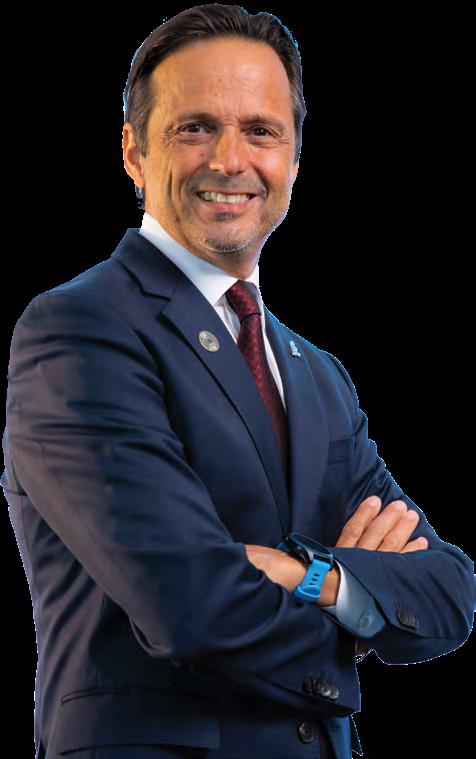
Group CEO, Red Sea Global
John Pagano, Group Chief Executive Officer of Red Sea Global (RSG), has been instrumental in steering the company toward a transformative journey, establishing it as a leader in sustainable luxury tourism. With decades of experience in real estate and tourism, John’s

vision aligns perfectly with Saudi Arabia’s Vision 2030, which aims to reimagine the Kingdom as a global destination for regenerative travel. Under his leadership, RSG has set new benchmarks for ecoconscious development, successfully blending innovation, environmental stewardship, and exceptional guest experiences.
Building on this vision, Red Sea Global has recently achieved a significant milestone with the launch of Shebara Resort, featuring 73 stunning overwater and beachfront villas designed by Killa Design. Unveiled in November 2024, the resort’s design has garnered international acclaim, earning a spot on TIME Magazine’s World’s Greatest Places of 2025. Powered entirely by five dedicated solar farms, part of a network of over 760,000 photovoltaic panels, the resort exemplifies RSG’s unwavering commitment to eco-luxury. Guests have the unique opportunity to arrive via seaplane or boat from the Red Sea International Airport, which began its international operations in April 2024, ensuring seamless access to an extraordinary experience amid pristine marine beauty.
As Phase One progresses, 16 luxury resorts are scheduled to open by end of 2025, with plans in place to welcome one million visitors annually. Additionally, AMAALA’s Triple Bay is nearing completion, showcasing signature projects such as the marine-focused Corallium Institute, the sleek Nammos Resort, and one of the world’s most ambitious wellness and yachting hubs. RSG’s evolution from a visionary developer to a cultural force is not only reshaping coastal tourism in Saudi Arabia but also redefining what sustainable destination-making can look like on a global scale.
Group Chief Development Officer ,
ROSHN Group

Oussama Kabbani, Group Chief Development Officer at ROSHN Group, is not merely shaping buildings—he’s crafting the future identity of Saudi Arabia’s urban life. With over three decades of global experience, from the historic streets of Beirut to the innovation corridors of Boston and Dubai, Oussama brings a unique blend of architectural refinement and strategic foresight to the Kingdom’s most ambitious developments. Since joining ROSHN in 2022, he has been at the helm of projects that are redefining the concept of community: SEDRA and WAREFA in Riyadh, ALAROUS and MARAFY in Jeddah, ALMANAR in Makkah, and ALDANAH in Dhahran.
These aren’t just developments—they’re statements. From open front yards to fully integrated walkable neighbourhoods, Oussama is steering a cultural shift in how Saudis live, connect, and thrive. Each project is a careful choreography of modern aesthetics and local identity, underpinned by sustainability principles that prioritise energy efficiency, water conservation, and liveability.
In the last year alone, ROSHN has expanded its geographic and conceptual footprint. New launches in Makkah and Dhahran (ALMANAR and ALDANAH) signal a deeper push into holistic community building, while high-profile stadium projects in Riyadh and Dammam underscore its entry into major civic and sports infrastructure. Parallel to this, progress continues on SEDRA, MARAFY, and ALAROUS— each community growing not just in scale, but in ambition.
With a Master’s in Urban Design from Harvard and an eye on shaping entire cities, Oussama is the architect of more than buildings—he is the designer of a new way of life. As ROSHN expands into new verticals and sets new benchmarks for development, his leadership ensures that every blueprint tells a bigger story: one of purpose, culture, and visionary growth.



Chairman and Founder, OSUS
Abdullah Almajed, Chairman and Founder of OSUS, has been the driving force behind one of Saudi Arabia’s most ambitious real estate success stories. With a sharp architectural sensibility and a future-facing ethos, Abdullah has elevated the company from a rising player to one of the Kingdom’s most influential developers— renowned for its distinctive aesthetic, bold scale, and masterful attention to context. His leadership has been instrumental in turning OSUS into a developer that doesn’t just build structures, but crafts destinations that speak to both place and purpose.
Among the standout developments is OSUS Al Marja, a premium residential enclave in northeast Riyadh that offers an elevated living experience defined by seamless planning, elegant design, and livability at scale. The 25, another iconic project, has become a beacon of contemporary design and luxury, strategically positioned in one of Riyadh’s most desirable locations. The OSUS Green Tower, meanwhile, represents the group’s commercial vision—delivering sustainability-driven office spaces with cutting-edge form and function.
Building on this momentum, the giant developer has recently unveiled OSUS View, a contemporary mixed-use development that redefines skyline living with its blend of smart residences and experiential retail. Yet, the company’s most defining leap comes in the form of OSUS Eye—a monumental project designed to become a visual and cultural landmark in Riyadh’s urban fabric. With its ambitious architecture and expansive scale, the project is poised to become a signature destination, anchoring OSUS’s growing footprint in the Kingdom.
Today, OSUS stands among the largest and most respected real estate developers in Saudi Arabia, a position earned through consistent delivery, uncompromising quality, and a deep-rooted commitment to the Kingdom’s urban transformation. Under Abdullah’s direction, the company continues to shape the narrative of modern Saudi living— creating spaces that are innovative yet grounded, luxurious yet accessible, and always built to last.



Member of the Board, Managing Director and CEO, NEOM
Eng. Aiman Al-Mudaifer brings decades of leadership experience across Saudi Arabia’s public and private sectors. Currently serving as Board Member, Managing Director, and CEO of NEOM. Prior to NEOM, he led the Local Real Estate Investment Division at the Public Investment Fund (PIF), where he oversaw two major streams: Saudi’s five flagship giga-projects—
NEOM, Red Sea Global, Qiddiya, Roshn, and Diriyah— and a portfolio of over 50 strategic real estate and infrastructure investments focused on modern urban living and economic diversification.
His strategic influence extends further as Chairman of the Board at King Abdullah Financial District (KAFD) and as a board member of Diriyah Gate Company and AlSouda Development Company. Earlier in his career, Eng. Al-Mudaifer held leadership roles including CEO of Shomoul Holding, Founder & CEO of Andalus Company, and managerial posts at the Capital Market Authority and Saudi Industrial Development Fund (SIDF).
Now leading NEOM, Eng. Al-Mudaifer plays a pivotal role in steering one of the Kingdom’s most ambitious giga-projects. NEOM is Saudi Arabia’s boldest giga-project—an ambitious $500 billion initiative redefining the future of urban living, sustainability, and innovation. Spanning over 26,000 km² in the Kingdom’s northwest, NEOM is home to groundbreaking developments like THE LINE, OXAGON, and TROJENA, all designed to pioneer smart cities, green energy, and advanced technology, while positioning Saudi Arabia at the forefront of global transformation.
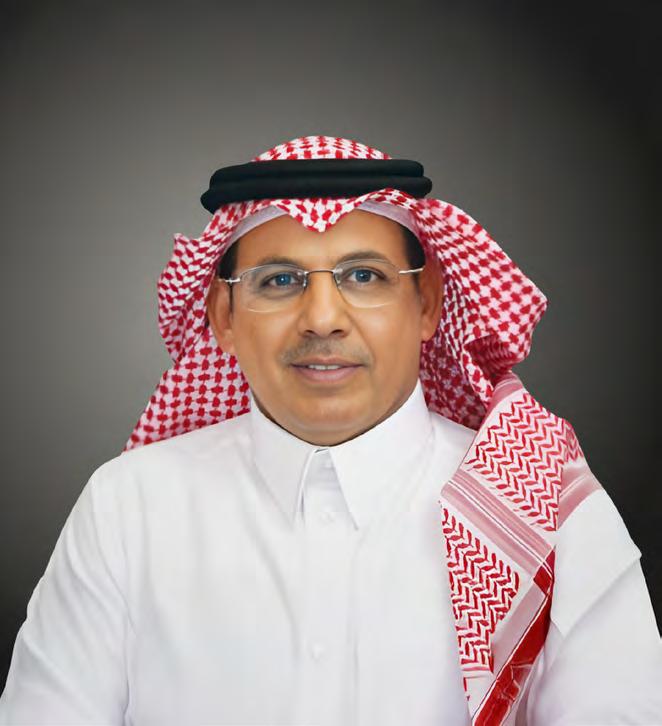
CEO, Rua Al Madinah Holding

Eng. Ahmad Al Juhani, CEO of Rua Al Madinah Holding, is at the helm of one of Saudi Arabia’s most ambitious urban regeneration efforts, where reverence for heritage meets the rigour of modern development. Tasked with reimagining the core of Madinah without compromising its sanctity, Ahmad has positioned the company as a guardian of culture and a pioneer in smart urbanism.
Rua Al Madinah’s flagship project—the redevelopment of 1.5 million square metres around the Prophet’s Mosque—will deliver 47,000 new hotel rooms, transit infrastructure, and pedestrian-friendly boulevards that honour the city’s spiritual legacy while addressing future growth. This monumental undertaking fuses Islamic architectural vernacular with sustainable design and intelligent systems.
Ahmad’s leadership reframes urban development not as a disruption, but as an evolution—one that elevates the city’s status as a global spiritual and cultural hub.
Khalid bin Hassan Al-Qahtani, the dynamic Chairman and CEO of Rikaz, has played a pivotal role in elevating the company to a leading position in Saudi Arabia’s real estate sector. His leadership is characterized by a strategic and forwardthinking focus on innovation and sustainable development. He blends modern architectural practices with cultural authenticity to create spaces that cater to contemporary needs while preserving the Kingdom’s rich heritage.
Under Khalid’s guidance, Rikaz has successfully executed numerous projects that reflect the company’s commitment to quality and innovation. By prioritizing sustainability and integrating advanced technologies, Rikaz is shaping the future of urban living in Saudi Arabia. The company’s work spans residential, commercial, and mixed-use developments, all designed to enhance the quality of life for residents and visitors alike.
Khalid’s visionary approach ensures that Rikaz remains a key player in the industry, contributing to the broader goals of Saudi Arabia’s Vision 2030. His leadership continues to inspire growth and innovation within the company, positioning Rikaz as a forward-thinking leader in the real estate landscape.



Since March 2022, Saleh Aloraini has led Soudah Development with over 15 years of expertise in real estate and project management. He is responsible for guiding the company’s strategic vision—turning Soudah Peaks into one of Saudi Arabia’s most ambitious mountain tourism destinations.
Under Saleh’s leadership, Soudah Peaks is advancing steadily. In 2024, the company appointed Parsons for project management consultancy and AECOM for detailed architectural and engineering design—reinforcing its commitment to global best practice. The masterplan unfolds in three phases: phase one (2024–2026) will deliver 940 hotel units, 391 residential units, and 1,025 staff accommodations across five of six zones.

CEO, Soudah Development Company
Sustainability is central to the project. Saleh led Soudah Development’s sustainability showcase at the Saudi Green Initiative Forum 2024, where it pledged to plant one million trees, reintroduce native ibexes and gazelles, and restore Rijal Almaa heritage sites in alignment
with UNESCO and UN goals. A highprofile partnership with Warner Bros. Discovery unveiled three documentaries to elevate Soudah’s unique cultural heritage to global audiences.
The company is also investing in community upliftment: an English language scholarship program in collaboration with King Khalid University and empowerment workshops for local youth reflect Saleh’s inclusive vision.
Through rigorous planning, sustainability initiatives, cultural storytelling, and world-class partnerships, Saleh Aloraini is redefining mountain tourism—steering Soudah Peaks toward becoming a legacy project aligned with Vision 2030.
CEO, Rafal Real Estate Development Co.

Since his appointment in September 2021, Elias has guided Rafal Real Estate into Saudi Arabia’s vanguard of smart, mixed-use real estate. Under his leadership, Rafal has advanced its Vision 2030 alignment, deepening its role in public–private partnerships and digital innovation across residential and commercial projects.

Rafal is best known for Burj Rafal, a 308‑metre, 68‑storey mixed use skyscraper on King Fahd Road in Riyadh. Housing a luxury hotel, serviced apartments, offices, and residences, it is the tallest residential tower in the Kingdom and a landmark of modern urbanism.
Newer flagship initiatives include the Alegria development in Al Narjes—3,580 residential units— and recently launched strategic collaborations such as the Kanoo–Rafal partnership to accelerate sustainable community building in Riyadh’s high demand districts.
On the innovation front, Rafal has been piloting real estate tokenisation, enabling accessible fractional investments, and deploying digital twin and IoT systems for smarter operations and tenant engagement.
Guided by Elias, Rafal is redefining Saudi’s real estate ethos: seamless integration of landmark architecture (Burj Rafal), large scale community living (Alegria), and pioneering tech in property investment and asset management. The company continues to gain investor confidence while delivering new models of sustainable and digitally enabled urban development.


Save time with the most efficient A4-A0 experience. 2 Seamlessly print A4 jobs with integrated input and output trays, keeping pages sorted by size. The flat 40-page stacker makes collection easy, while fast print speeds keep projects moving.

Work securely from virtually anywhere. You can save time by printing in fewer steps with HP Click. Protect your printer and data from cyberthreats with HP Wolf Pro Security. Manage your device and print remotely with HP app.


Go beyond and advance your environmental goals with a printer made with recycled plastics and recyclable supplies. This robust, compact plotter is designed to last while also helping to reduce energy and ink waste.
Scan to learn more

One year after its regional debut, the all-new Nissan Patrol has achieved over 50% year-on-year sales growth in H1 FY25, reaffirming its popularity in a key market. With the introduction of the Patrol PRO-4X and the most powerful Patrol NISMO ever—developed exclusively for the Middle East—Nissan offers a versatile line-up that seamlessly blends innovation with heritage.
A flagship model in the region for more than 70 years, the Patrol continues to combine strength, endurance, and advanced technology, delivering a digital-first experience that evolves with drivers’ needs. It is the first global Nissan model to feature the MyNissan Ownership function in the
MyNissan App, allowing users to manage service bookings, schedule test drives, and access curated lifestyle experiences through a single, integrated app.
To mark the first anniversary of the all-new Patrol’s Middle East launch, Nissan hosted a desert celebration in the UAE. A convoy of over 20 Patrols— including the NISMO, PRO-4X, and V6T Platinum—traversed the dunes, guided by three black horses, one ridden by a horsewoman, highlighting the Patrol’s enduring connection to the desert and local heritage. Senior Nissan executives from Japan, Europe, and the Middle East attended, underscoring the Patrol’s role as a cornerstone of Nissan’s global SUV strategy and its continued
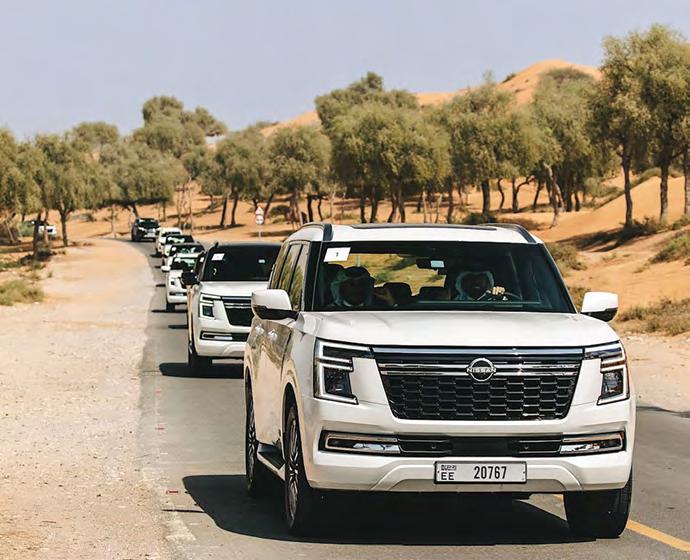
legacy of power, prestige, and progress in the region.
Richard Candler, Vice President, Global Product Strategy, Nissan Motor Co., said: “The Patrol remains a cornerstone of Nissan’s global portfolio and the pinnacle of our SUV strategy, combining precision engineering with cutting-edge innovation. Continually enhanced through software updates that improve safety, performance, and comfort, it stays at the forefront of progress. The Middle East has long shaped the Patrol’s identity, inspiring our teams worldwide and setting the benchmark for trust, strength, and prestige.
Thierry Sabbagh, Divisional Vice President, President – Middle East, KSA, CIS, Nissan and INFINITI, added: “The Patrol has always stood for strength, progress and connection – values that mirror the spirit of the Middle East. Over the past year, customer response to the all-new Patrol has been overwhelmingly positive, exceeding expectations across the region. To buy a Nissan Patrol has become synonymous with buying complete peace of mind in the car, and the services behind it. We listened closely to what our customers wanted, and delivered – creating the dedicated all-terrain Patrol PRO-4X and making the Patrol NISMO even more powerful, while ensuring that every version reflects the needs and aspirations of our customers. As we
(L-R) Clíodhna Lyons_AMIEO VP Product Strategy and Planning - Richard Candler - Thierry Sabbagh - Saad Hassan_AMIEO VP OPD

unite the complete Patrol family, we honour an icon that offers more power, more precision and more intelligence than ever before – inspired by the region and embraced around the world.”
• The All-new Patrol– Feel Iconic Blending over 70 years of heritage with cutting-edge innovation, the all-new Patrol embodies refined strength and prestige. Its twin-turbo V6 engine, paired with adaptive air suspension, delivers effortless on-road comfort, while upgraded technology and connectivity provide a truly digital-first experience. The Patrol stands as a symbol of capability, refinement, and pride.
• The Patrol PRO-4X – Feel Adventurous The Patrol PRO-4X represents the rugged spirit of adventure. Equipped with all-terrain capability, high-clearance fascia, reinforced chassis, and adventure-ready design, it is engineered to tackle the Middle East’s most challenging terrain without compromising comfort or safety.
• The Patrol NISMO – Feel the Thrill
At the pinnacle of performance is the Patrol NISMO, developed exclusively for the Middle East. Channeling nearly 500 horsepower through a GT-R-derived twin-turbo V6, it has been tuned by NISMO engineers for sharper handling, superior control, and commanding presence, a true showcase of Nissan’s motorsport DNA.
Beneath the bonnet, the all-new Patrol is powered by a 3.5-litre twin-turbo V6, delivering 425 horsepower and 700 Nm of torque—a 7% increase in power and 25% rise in torque over its predecessor, while achieving around 24% better fuel efficiency. For the first time, an adaptive air suspension intelligently adjusts ride height, damping, and stability to suit terrain, load, and driving mode, ensuring exceptional comfort and composure whether on desert dunes, winding highways, or rugged tracks.
The Patrol redefines modern luxury with handcrafted materials and intelligent design that blend Japanese precision with regional sophistication. Features include Zero Gravity seats for long-drive comfort, Biometric Cooling that adapts airflow to passengers, a panoramic sunroof, and immersive sound from the premium Klipsch audio system.
The all-new Nissan Patrol offers a smarter, more personalised driving experience with advanced technology. Features include ProPILOT driver assistance, NissanConnect with Google builtin, and the Middle East debut of Connected Car Services 2.0 (CCS 2.0), enabling remote functions such as lock/unlock, engine start, cabin preconditioning, and real-time system diagnostics.
Supported by Nissan’s extensive regional dealer network, the Patrol continues its legacy of trust, power, and innovation, marking one year since its global UAE debut.
Since its 2023 debut, the Dubai resort has continued to expand its luxury offerings, from celebrity-chef restaurants and immersive entertainment spectacles to 760 sky-facing rooms and suites, solidifying its status as a global hospitality icon.
Atlantis The Royal has been named No. 6 in the global ranking of The World’s 50 Best Hotels 2025. Following a successful debut in 2023, the resort’s latest accolade was announced at the third edition of The World’s 50 Best Hotels awards ceremony in London alongside industry-defining hotels from across the globe. In addition, the resort was bestowed two special accolades, including the Lost Explorer Best Beach Hotel Award 2025 and Best Hotel in the Middle East 2025.
The awards ceremony once again brought together the world and hospitality community to celebrate the world’s best hotels. Held at London’s iconic Old Billingsgate on the banks of the River Thames, the event showcased exceptional hotel experiences
that will inspire consumers, travellers and hoteliers around the globe.
Marking its two-year anniversary earlier this year, Atlantis The Royal remained on The World’s 50 Best Hotels ranking at No. 6. Already established as an iconic Dubai landmark, the resort continues to redefine the future of luxury hospitality. Whether in gastronomy, fashion, or entertainment, Atlantis The Royal leads with pioneering collaborations from Dolce&Gabbana’s vibrant new Carretto Siciliano takeover at Cloud 22 in partnership with Ounass, to the launch of CARBONE Dubai, Major Food Group’s celebrated ItalianAmerican restaurant, unveiled with a glittering, star-studded celebration and hailed as one of the most anticipated openings of the year. The resort has also debuted the immersive “Diamond in the Desert” fire-meets-water spectacle by Hans Zimmer, elevating the legendary Skyblaze Fountain to new heights. With 760 exquisite rooms, suites, and signature penthouses, guests can swim amongst the clouds in sky-pools and dine at more celebrity-

chef restaurants than anywhere else in the world.
Emma Sleight, Head of Content for The World’s 50 Best Hotels, says: “We’re delighted to return to London for the third edition of The World’s 50 Best Hotels. It’s an honour to gather so many leading voices in travel, hospitality and hotels – and to celebrate the very best. Our warmest congratulations go to every hotel on this year’s list, each of which has clearly made a lasting impression on our newly expanded Academy of travel experts. We hope 2025’s list sparks inspiration for travellers as they plan their next trip.”
Paul Baker, President of Atlantis, comments: “It is an exceptional honour to see Atlantis The Royal recognised among The
World’s 50 Best Hotels for the third consecutive year, and we are incredibly proud to be bestowed two special awards – the Lost Explorer Best Beach Hotel Award 2025 and Best Hotel in the Middle East 2025. This recognition is a testament to the dedication and passion of our colleagues, whose commitment to delivering exceptional guest experiences has been at the heart of our success since day one. Guided by the visionary leadership of Kerzner International, we remain steadfast in our ambition to shape the future of luxury hospitality through innovation, authenticity, and an unwavering commitment to creating extraordinary guest experiences.”
The World’s 50 Best Hotels 2025
was revealed as part of a live countdown from No.50 to No.1. The ranking is complemented by a host of special awards alongside the first ever 51-100 list and reflects the very best travel experiences around the globe, collated from the votes of 800 anonymous experts. This voting panel – the 50 Best Hotels Academy – comprises a balanced mix of hoteliers, travel journalists, educators and seasoned luxury travellers, led by a group of industry-leading Academy Chairs.
This year has marked yet another extraordinary chapter for Atlantis The Royal, with a series of prestigious international accolades further solidifying its position as the world’s leading ultra-luxury experiential resort. Atlantis The Royal was the first hotel in the region to be bestowed three Keys at MICHELIN Guide’s inaugural global MICHELIN Key Selection ceremony in Paris this year. In addition, The Guide presented a brand-new accolade to Atlantis The Royal, where it received the MICHELIN Architecture & Design Award, one of four special awards announced during the occasion. In addition, Atlantis The Royal once again earned the coveted Five-Star award for the second consecutive year in the Forbes Travel Guide 2025.
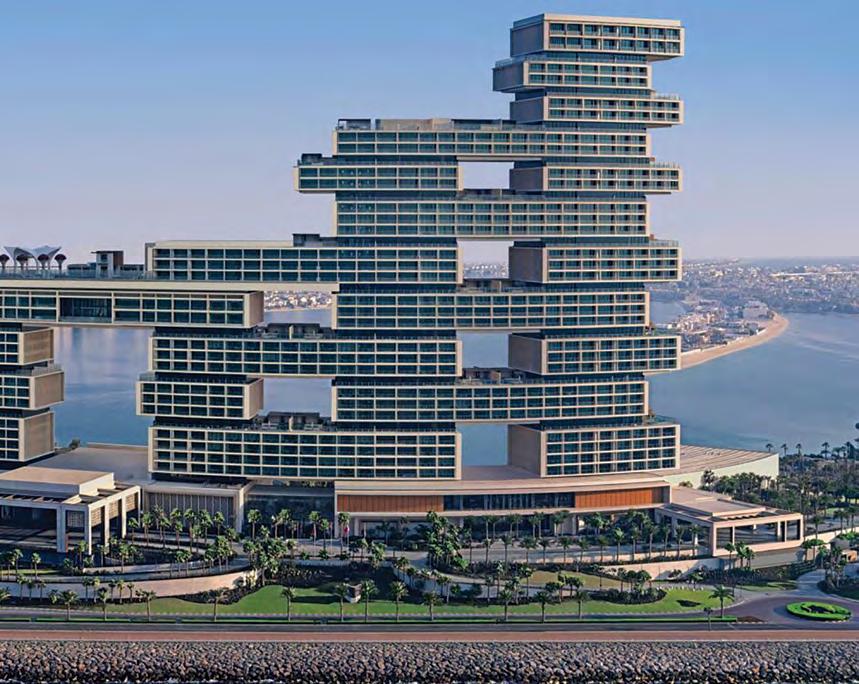
What began as Fiamma Ferragamo’s vision for modern elegance in 1978 has become one of Maison’s most enduring emblems. The Vara bow celebrates every woman’s unique rhythm - poised, purposeful, and forever in motion.
It is an expression of pure originality, captured in the Vara bow. Born almost by chance from an idea by Fiamma Ferragamo, it has become, over time, one of Maison’s most cherished emblems.
It’s a celebration of what makes every woman unique: each with her own stride, her own story, her own identity and femininity. It’s the timeless versatility of a code that, then as now, has always moved with the times. First, in 1978, when Fiamma, Salvatore’s eldest daughter, designed the Vara shoe for a new generation of emancipated, on-thego women who demanded both comfort and sophistication. And now, in our fast-paced present, where women shape their lives with passion and boldness, seeing what they wear as an extension of their personality.
This is the narrative at

the heart of the new Vara Bow project, brought to life by a cast of special women who embody a heritage that has always captured the spirit of modernity, across diverse generations and lifestyles. Bianca Balti, Fiamma Paternò Castello di San Giuliano, Paloma Elsesser, and Hyeri Lee star in a series of intimate portraits, sharing their stories

and their unique, spontaneous take on wearing the Vara bowfrom the classic pump and the Mary Jane to the 55mm slingback and 95mm sandal.
The visuals - which also feature a cameo from Fiamma’s sister, Giovanna Gentile Ferragamocelebrate not just the Vara design, but the attitude it represents. In every form, that bow has always stood for freedom, authenticity, and the joy of moving through the world with elegance and determination. It’s an icon that, like the women who choose it, constantly evolves and renews itself without ever losing its essence.
Four women, with different backgrounds and personalities, show how the Vara bow fits into their lives, their style and context, wherever they are, from Milan to New York to Seoul.
Bianca Balti, a classic Italian beauty who built an international career, radiates extraordinary strength and resilience, on the runway as in life, always with a smile.
Fiamma Paternò Castello di San Giuliano, a member of the fourth generation of Ferragamo and niece of the very Fiamma who invented the Vara, weaves a continuous dialogue between heritage and the future, between the prestige of her family’s history and the aesthetic of a young woman with a passion for art.
Paloma Elsesser, a runway icon and activist for inclusivity, embraces her individuality through a language of authenticity, revealing an inspired and conscious sense of style that she uses as a genuine form of expression and selfaffirmation.
Hyeri Lee - one of South Korea’s most prominent young actresses, who debuted as a member of the group Girl’s Day - exudes a vibrant and dynamic energy, channeling a fresh, effortless cool that reveals Vara’s playful side.
At the time of Vara’s creation, the designers began
working with a last that had been tested and renowned for several seasons for its comfort, featuring a low heel and a rounded toe. A small oval decoration and an improvised bow, made from a scrap of grosgrain ribbon found in the atelier, were added to the prototype. The idea seemed good, and it was decided to give the shoe to the model- maker, asking him to craft the bow from the same leather as the upper. In reality, the message was misunderstood, and the bow remained in grosgrain.
By chance, in 1978, that ornamental detail remained in its prototype version, crowned with a metal plaque engraved with the logo. It soon became a signature

element, appearing not just on shoes but on jewelry, bags, belts, and small leather goods.
To this day, every fold of that bow holds the Maison’s emotional resonance and artisanal excellence: the mastery, creativity, and talent that for generations have defined Ferragamo and the women who inspire its vision—perfectly poised between tradition and progress, dedication and connection, elegance and empowerment.
You founded Miftah Lifestyle in 2022 after working in elite hospitality. What was the specific moment or experience that made you realize the UAE needed its own homegrown luxury concierge service?
At the time, global concierge companies based in London, Paris, Geneva and Monaco were performing well, yet their services here often felt transactional. It became clear that the UAE deserved a concierge service designed by local experts— professionals who could seamlessly blend international standards with a distinctly local touch, offering access and insights that only insiders could provide.
One defining moment crystallised this vision. A client urgently needed a dinner reservation at GAIA for an anniversary celebration. His London-based concierge could not secure a table, and the restaurant was fully booked. I personally drove to GAIA, spoke with the general manager, and managed to secure the booking, arranging the best table and the finest service for the evening.
from varied backgrounds, which allows us to adapt seamlessly to the unique needs of each client. Additionally, the UAE’s inherently diverse and cosmopolitan culture complements our ecosystem of clients and partners, enabling us to deliver luxury experiences that are both personalised and culturally attuned.
Christopher Oscar Kato, Founder of Miftah Lifestyle, shares how his experiences in elite hospitality inspired him to launch a UAE-based luxury concierge service, Miftah Lifestyle.
The UAE attracts ultra-high-net-worth individuals from around the world. How do you bridge different cultural expectations of luxury and service?
Our approach is entirely member-focused. We work with a network of highly credible local partners
For someone considering Dubai versus other luxury hubs like Singapore or Monaco, what unique advantages does Dubai offer that people don’t realize until they arrive?
Dubai’s true strength lies in its constant evolution. The city is incredibly diverse and dynamic, fostering an environment where “zero to hero” stories are possible. It offers something for everyone, with an open-market ethos and no barriers to entry across industries. Coming from a humble background in Uganda, the journey of building Miftah Lifestyle here illustrates how the UAE serves as a global stage, where ambition, innovation, and hard work can translate into remarkable achievement.
What unique challenges do expatriate families face in Dubai that Miftah specifically addresses through its Familyfocused services?
Relocating a high-net-worth family to Dubai requires meticulous attention to detail, from finding the right schools to securing trusted service providers. What sets Miftah apart is our personalised approach: we have cultivated strong relationships with the city’s top experts—from gardeners, doctors, and interior designers to contractors, teachers, and financial or real estate advisors.
By curating this A-list of local professionals and directly connecting them with our clients, we ensure that every aspect of relocation is seamless and

tailored to the family’s needs. In doing so, we remove the emotional load and logistical stress, allowing families to focus on what truly matters, spending quality time together and enjoying their new home.
As someone who’s been in Dubai’s luxury sector since before founding Miftah, what aspect of the city’s transformation makes you most optimistic about the next decade?
Dubai has evolved from being primarily a tourist destination to a vibrant, multicultural hub, now home to over 200 nationalities. What excites me most is how adaptable and forward-thinking the leadership is with safety as a priority, the UAE has introduced special visa programmes and incentives that attract top global talent and encourage leading corporations and families to make Dubai their home. With new communities continuing to emerge and
opportunities expanding across sectors, there has never been a better time or place to be part of the UAE’s story, and I am incredibly optimistic about the next decade of growth, innovation, and opportunity.
What’s the most important question you ask new members to understand how to tailor their experience, and why?
For me, it begins with understanding the distinction between a client’s life before Miftah and life after Miftah, because the two are often very different. The key question I ask every new member is: “When you envision a successful future with us, what does that success look like?”
You aim to inspire other aspiring founders. What’s the most honest advice you’d give someone wanting to enter the luxury lifestyle management space?
There’s a lot that goes on behind the scenes, and it isn’t always glamorous. Your network is your inventory when you start. Focus on building relationships, earning trust, and delivering on your promises today. My first paying client chose us purely based on the trust I had cultivated beforehand, we had no office, no email, no glossy brochures. The lesson is simple: invest time in your existing relationships, nurture trust, and everything else will follow.
What’s the most challenging or unusual request you’ve fulfilled that really tested Miftah’s “limitless living” philosophy?
One memorable case involved a CEO relocating from Geneva to Dubai. The decision to move hinged on his family’s approval. We found an exceptional home in one of Dubai’s most prestigious communities, and while the wife absolutely loved it, there was a no-pet policy—and their dog was a cherished family member. This policy posed a real obstacle, to the point that they might not have relocated at all. Leveraging our strong relationships with key developers, we were able to amend the pet policy, not just for this family but across the community, ensuring their dog could move with them. It was a perfect example of how trust, influence, and local connections allow Miftah to turn complex challenges into seamless, “limitless” experiences for our clients.

In a city known for pushing the boundaries of architecture and setting new benchmarks, a landmark project is emerging along its pristine coastline. Solaya, an exclusive collection of 234 beachfront residences in the Jumeirah 1 neighbourhood, is poised to redefine residential living.
Solaya has been described as a blend of architectural precision and understated elegance. What was the overarching vision that guided Foster + Partners’ design for this landmark coastal development?
Our overarching vision is to provide a collection of curated residences that offer refined luxury living, where the city meets the sea. The collaboration between Meraas and Brookfield Properties has been instrumental in crafting this vision. The buildings will be surrounded by incredible native greenery, and every apartment will be orientated to maximise views and celebrate indoor-outdoor living by the beach. We are also generating a brandnew civic space for Dubai, which takes the form of a spectacular landscaped park at the centre of the site.
How did the unique beachfront setting in Jumeirah 1 influence the form, orientation, and spatial organisation of Solaya’s nine buildings?
The scheme comprises two distinct residential collections, which are connected by the new park that overlooks the beach. Landscaping flows seamlessly from the park into the residential areas, creating a green sanctuary in the heart of Dubai.
The residential buildings have been designed from the inside out, so that their external appearance is defined by the arrangement of the apartments’ different rooms. The rooms are rotated to provide each apartment with direct views along the coast and towards the city’s skyline, resulting in a highly varied and stepped façade.
What architectural strategies did you employ to blur the boundaries between interior and exterior spaces while maintaining privacy and comfort for residents?
We are using rough-cast stone from the local area for the buildings’ vertical walls, creating a tactile, natural feel that connects the architecture to its beach context. This is contrasted with highly machined balcony elements, establishing a dialogue between natural and engineered materials.
Our design also blurs the boundaries between interior and exterior spaces – and includes landscape features within the apartments to enhance residents’ connections to the surrounding environment. The apartments feature courtyards, balconies, and outdoor terraces, which harmoniously blend nature with comfortable indoor living.
Ground-floor homes connect with private gardens, while the whole-floor penthouses have their own dedicated lift access, private pools, and 360-degree views.
We are also incorporating significant landscaped areas between the buildings and the beach, which allows residents to ‘breathe out’ upon arrival. This transition from the intensity of the city to the relaxed beach environment is a key experiential element of the project.


